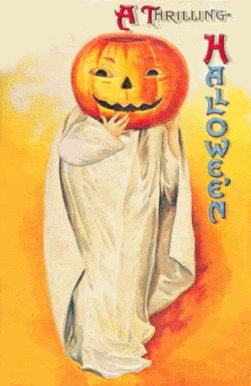Saturday, November 01, 2008
Indulgences To Be Gained For the Poor Souls During November
Holy Mother the Church is very liberal with regard to the gaining of indulgences for the Poor Souls in Purgatory during November.
Labels: Hallowmas
All Hallows 2008
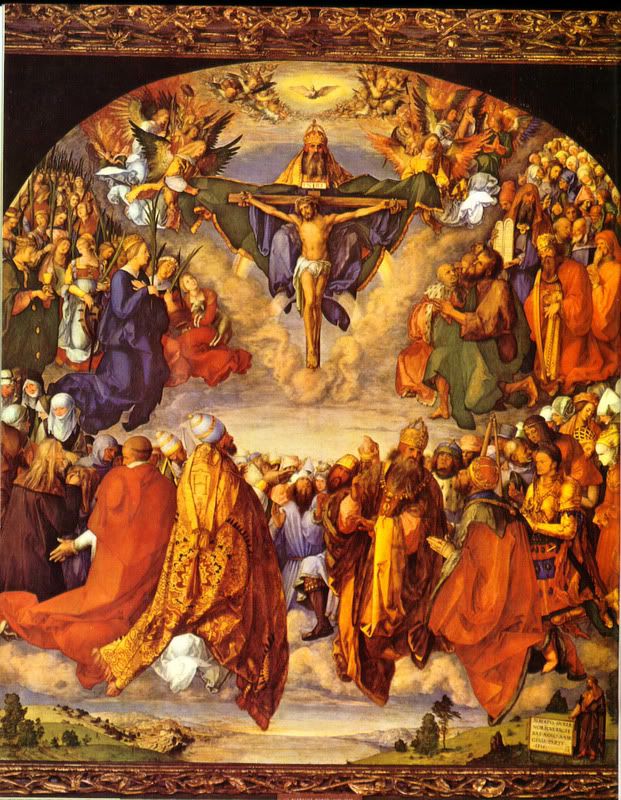
For All the Saints
For all the saints, who from their labors rest,
Who Thee by faith before the world confessed,
Thy Name, O Jesus, be forever blessed.
Alleluia, Alleluia!
Thou wast their Rock, their Fortress and their Might;
Thou, Lord, their Captain in the well fought fight;
Thou, in the darkness drear, their one true Light.
Alleluia, Alleluia!
For the Apostles’ glorious company,
Who bearing forth the Cross o’er land and sea,
Shook all the mighty world, we sing to Thee:
Alleluia, Alleluia!
For the Evangelists, by whose blest word,
Like fourfold streams, the garden of the Lord,
Is fair and fruitful, be Thy Name adored.
Alleluia, Alleluia!
For Martyrs, who with rapture kindled eye,
Saw the bright crown descending from the sky,
And seeing, grasped it, Thee we glorify.
Alleluia, Alleluia!
O blest communion, fellowship divine!
We feebly struggle, they in glory shine;
All are one in Thee, for all are Thine.
Alleluia, Alleluia!
O may Thy soldiers, faithful, true and bold,
Fight as the saints who nobly fought of old,
And win with them the victor’s crown of gold.
Alleluia, Alleluia!
And when the strife is fierce, the warfare long,
Steals on the ear the distant triumph song,
And hearts are brave, again, and arms are strong.
Alleluia, Alleluia!
The golden evening brightens in the west;
Soon, soon to faithful warriors comes their rest;
Sweet is the calm of paradise the blessed.
Alleluia, Alleluia!
But lo! there breaks a yet more glorious day;
The saints triumphant rise in bright array;
The King of glory passes on His way.
Alleluia, Alleluia!
From earth’s wide bounds, from ocean’s farthest coast,
Through gates of pearl streams in the countless host,
And singing to Father, Son and Holy Ghost:
Alleluia, Alleluia!
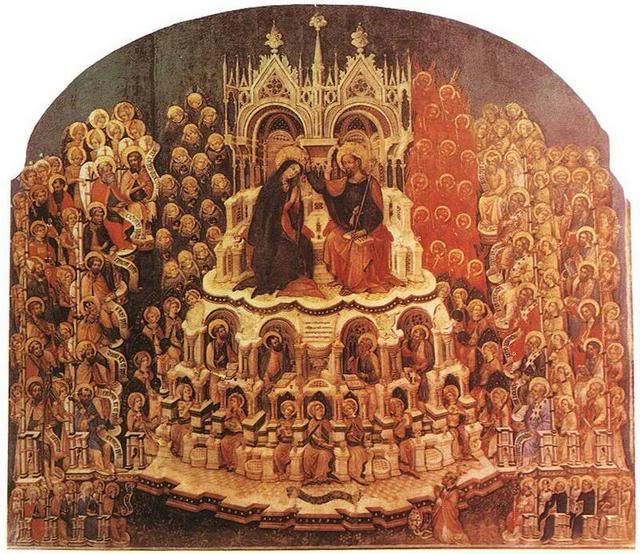
The Litany of the Saints
Lord, have mercy on us. (Lord have mercy on us.)
Christ, have mercy on us. (Christ have mercy on us.)
Lord, have mercy on us. (Lord, have mercy on us.)
Christ, hear us. (Christ, hear us.)
Christ, graciously hear us. (Christ, graciously hear us.)
God the Father of heaven, (have mercy on us.)
God the Son, Redeemer of the world, (have mercy on us.)
God the Holy Ghost, (have mercy on us.)
Holy Trinity, one God, (have mercy on us.)
Holy Mary, (Pray for us.)
Holy Mother of God,
Holy Virgin of virgins,
St. Michael,
St. Gabriel,
St. Raphael,
All ye holy Angels and Archangels,
All ye holy orders of blessed Spirits,
St. John the Baptist,
St. Joseph,
All ye holy Patriarchs and Prophets,
St. Peter,
St. Paul,
St. Andrew,
St. James,
St. John,
St. Thomas,
St. James,
St. Philip,
St. Bartholomew,
St. Matthew,
St. Simon,
St. Thaddeus,
St. Matthias,
St. Barnabas,
St. Luke,
St. Mark,
All ye holy Apostles and Evangelists,
All ye holy Disciples of the Lord,
All ye holy Innocents,
St. Stephen,
St. Lawrence,
St. Vincent,
SS. Fabian and Sebastian,
SS. John and Paul,
SS. Cosmas and Damian,
SS. Gervase and Protase,
All ye holy Martyrs,
St. Sylvester,
St. Gregory,
St. Ambrose,
St. Augustine,
St. Jerome,
St. Martin,
St. Nicholas,
All ye holy Bishops and Confessors,
All ye holy Doctors,
St. Anthony,
St. Benedict,
St. Bernard,
St. Dominic,
St. Francis,
All ye holy Priests and Levites,
All ye holy Monks and Hermits,
St. Mary Magdalen,
St. Agatha,
St. Lucy,
St. Agnes,
St. Cecilia,
St. Catherine,
St. Anastasia,
All ye holy Virgins and Widows,
All ye holy Saints of God, (Make intercession for us.)
Be merciful, (Spare us, O Lord.)
Be merciful, (Graciously hear us, O Lord.)
From all evil, O Lord (Deliver us.)
From all sin,
From Thy wrath,
From sudden and unlooked for death,
From the snares of the devil,
From anger, and hatred, and every evil will,
From the spirit of fornication,
From lightning and tempest,
From the scourge of earthquakes,
From plague, famine and war,
From everlasting death,
Through the mystery of Thy holy Incarnation,
Through Thy Coming,
Through Thy Birth,
Through Thy Baptism and holy Fasting,
Through Thy Cross and Passion,
Through Thy Death and Burial,
Through Thy holy Resurrection,
Through Thine admirable Ascension,
Through the coming of the Holy Ghost, the Paraclete.
In the day of judgment.
We sinners, (We beseech Thee, hear us.)
That Thou wouldst spare us,
That Thou wouldst pardon us,
That Thou wouldst bring us to true penance,
That Thou wouldst vouchsafe to govern and preserve Thy holy Church,
That Thou wouldst vouchsafe to preserve our Apostolic Prelate, and all orders of the Church in holy religion,
That Thou wouldst vouchsafe to humble the enemies of holy Church,
That Thou wouldst vouchsafe to give peace and true concord to Christian kings and princes,
That Thou wouldst vouchsafe to grant peace and unity to the whole Christian world,
That Thou wouldst call back to the unity of the Church all who have strayed from her fold, and to guide all unbelievers into the light of the Gospel
That Thou wouldst vouchsafe to confirm and preserve us in Thy holy service,
That Thou wouldst lift up our minds to heavenly desires,
That Thou wouldst render eternal blessings to all our benefactors,
That Thou wouldst deliver our souls, and the souls of our brethren, relations, and benefactors, from eternal damnation,
That Thou wouldst vouchsafe to give and preserve the fruits of the earth,
That Thou wouldst vouchsafe to grant eternal rest to all the faithful departed,
That Thou wouldst vouchsafe graciously to hear us,
Son of God,
Lamb of God, who take away the sins of the world, (spare us, O Lord.)
Lamb of God, who take away the sins of the world, (graciously hear us, O Lord.)
Lamb of God, who take away the sins of the world, (have mercy on us.)
Christ, (hear us.)
Christ, (graciously hear us.)
Lord, have mercy, (Lord, have mercy.)
Christ, have mercy, (Christ, have mercy.)
Lord, have mercy, (Lord, have mercy.)
[Our Father inaudibly] And lead us not into temptation (but deliver us from evil.)
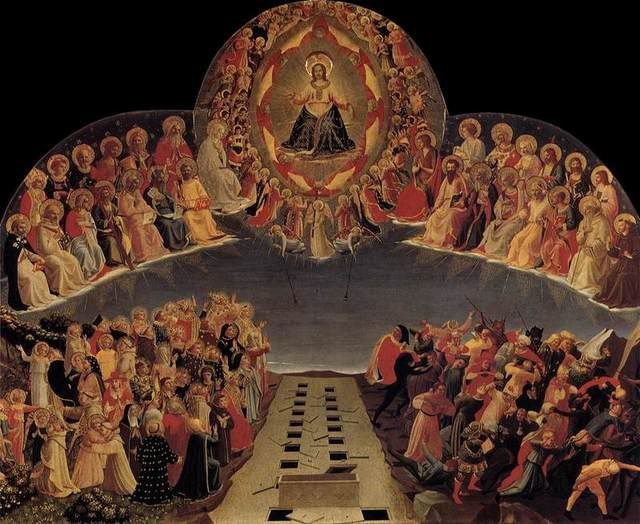
Penitens has a wonderful listing of the saints from the litany, with illustrations.
Also, see Jay at Pro Ecclesia for an excellent summation, bringing together and uniting the history of Halloween and Hallowmas.
Terry at Abbey Roads 2 has another excellent post.
Hallowmas in the Philippines, at Ecce Ego, Quia Vocasti Me.
Our Blessed Lady's Saturday

PURGATORY AND OUR LADY'S PROMISE
When Our Lady of Fatima told us about a young girl who will remain in Purgatory until the end of time she wanted to remind us of our own possible place in the life to come; she wanted to help us. And among the many ways of avoiding Purgatory we find one way given by Our Lady herself; it is called the "Sabbatine Privilege" [see Below] and is the second of two great Promises she attached to her Brown Scapular. Here then, is another reason why Our Lady held out her Scapular in the very last apparition at Fatima.
Labels: Our Blessed Lady
November 2008
Important feasts celebrated in November include:
1st All Hallows
2nd All Souls (celebrated this year on the 3rd, as the 2nd is a Sunday)
3rd St. Malachy O'More
4th St. Charles Borromeo
5th St. Elizabeth
7th Bl. John Duns Scotus
10th St. Pope Leo the Great
11th Martinmas, St. Martin of Tours
15th St. Albertus Magnus
16th St. Gertrude the Great
17th St. Elizabeth of Hungary
18th St. Odo of Cluny
22nd St. Cecilia
23rd St. Columbanus
26th St. Leonard of Port Maurice
28th St. Catherine Laboure
30th St. Andrew
November is dedicated to the poor Holy Souls in Purgatory.
Our Holy Father Pope Benedict XVI's prayer intentions for the month of November, 2008:
General:
That the testimony of love offered by the Saints, may fortify Christians in their service to God and neighbour, imitating Christ who came not to be served but to serve.
Mission:
That Christian communities in Asia, contemplating the face of Christ, may find the most suitable way to announce Him in full fidelity to the Gospel to the peoples of that vast continent so rich in culture and ancient forms of spirituality
The First Friday of the month is November 8th.
The First Saturday of the month is November 1st.
This year, most of November is in the Time After Pentecost. Sunday November 30th is the First Sunday of Advent.
Thursday 27th is Thanksgiving Day in the United States.
Important novenas associated with November include the Novena for the Holy Souls in Purgatory, began traditionally on All Souls, and The Advent(or Christmas) Novena, said from Saint Andrew's Day (Nov. 30th) until Chirstmas Eve.
Thomas Hood's 1844 ditty quite often is accurate with regard to the weather on the First of November.
No sun - no moon!
No morn - no noon -
No dawn - no dusk - no proper time of day.
No warmth, no cheerfulness, no healthful ease,
No comfortable feel in any member -
No shade, no shine, no butterflies, no bees,
No fruits, no flowers, no leaves, no birds! -
November!
Often enough November 1st here is a cold, raw, damp, cloudy, blustery day, bringing an unwelcome curtain down on October's brilliance.
1st All Hallows
2nd All Souls (celebrated this year on the 3rd, as the 2nd is a Sunday)
3rd St. Malachy O'More
4th St. Charles Borromeo
5th St. Elizabeth
7th Bl. John Duns Scotus
10th St. Pope Leo the Great
11th Martinmas, St. Martin of Tours
15th St. Albertus Magnus
16th St. Gertrude the Great
17th St. Elizabeth of Hungary
18th St. Odo of Cluny
22nd St. Cecilia
23rd St. Columbanus
26th St. Leonard of Port Maurice
28th St. Catherine Laboure
30th St. Andrew
November is dedicated to the poor Holy Souls in Purgatory.
Our Holy Father Pope Benedict XVI's prayer intentions for the month of November, 2008:
General:
That the testimony of love offered by the Saints, may fortify Christians in their service to God and neighbour, imitating Christ who came not to be served but to serve.
Mission:
That Christian communities in Asia, contemplating the face of Christ, may find the most suitable way to announce Him in full fidelity to the Gospel to the peoples of that vast continent so rich in culture and ancient forms of spirituality
The First Friday of the month is November 8th.
The First Saturday of the month is November 1st.
This year, most of November is in the Time After Pentecost. Sunday November 30th is the First Sunday of Advent.
Thursday 27th is Thanksgiving Day in the United States.
Important novenas associated with November include the Novena for the Holy Souls in Purgatory, began traditionally on All Souls, and The Advent(or Christmas) Novena, said from Saint Andrew's Day (Nov. 30th) until Chirstmas Eve.
Thomas Hood's 1844 ditty quite often is accurate with regard to the weather on the First of November.
No sun - no moon!
No morn - no noon -
No dawn - no dusk - no proper time of day.
No warmth, no cheerfulness, no healthful ease,
No comfortable feel in any member -
No shade, no shine, no butterflies, no bees,
No fruits, no flowers, no leaves, no birds! -
November!
Often enough November 1st here is a cold, raw, damp, cloudy, blustery day, bringing an unwelcome curtain down on October's brilliance.
Labels: First Of the Month
Friday, October 31, 2008
Wanna Huck Pumpkins At Skeletons, Ghosts, and Other Greeblies?
Try this little game, which I first found a few years ago. Loads of fun for the minimally eye-hand-coordinated.
Labels: Hallowmas
More Halloween Offerings

A truly neat Memento Mori baseball cap, but I lost the link. It is Cafe Press, but when I went back to look for it, I just came up blank.

This is pretty much the way I like to carve a jack. I usually prefer a rounder pumpkin, though.

Very Famous Ghost Picture
This picture depicts the Brown Lady of Raynham Hall, England. I was just reading this story the other day in John Canning's 50 Great Ghost Stories, which has been part of my Halloween reading these 30 years now.
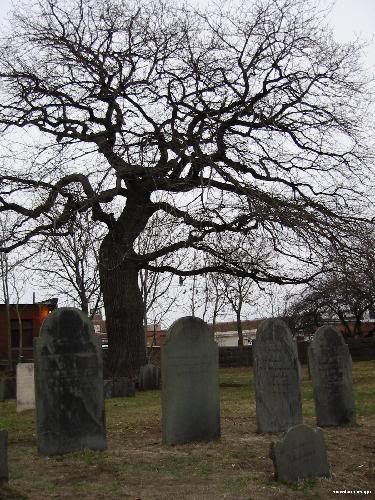
One of the most interesting trees I have ever seen, in the Charter Street Burial Ground, in Salem. I used to smoke cigars under it when I lived a block around the corner from it.
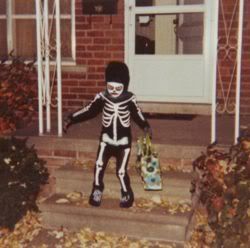
Classic Trick-Or-Treater pic. I have no idea who this is, when or where it was taken, but I dressed in a costume like that one year in the late 1960s or early 1970s.

Death Calls For All Of Us.
Memento Mori
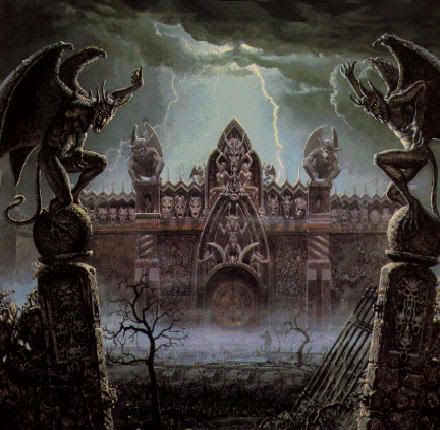
Gargoyles are cool

Nice effect

The October People Are Here
Dummies clothed in cast-offs and stuffed with leaves are a front yard staple. I used to put mine in a lawn chair, and rake a circle of leaves around it. Is the dummy a fall thing, or a Halloween thing? Mine tend to be fall things, though you can make them more eerie, and more suitable for Halloween.
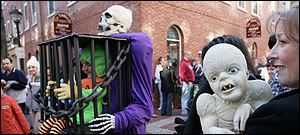
Halloween in Salem, from the Boston Globe online. I used to live in the building in the background. Take a tour of Salem via one of my photo-essays here.
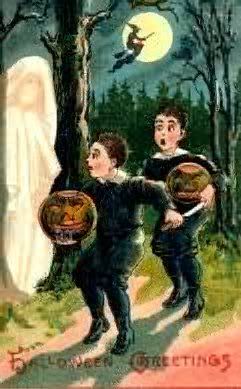
Be careful tonight. There are lots of strange things abroad on Halloween night.
Labels: Hallowmas
Foods For An Authentic Irish Halloween
The Irish, of course, quite apart from saving Western Civilization by safeguarding its learning and the classical tradition during the early Middle Ages, gave us what we now call Halloween.
In Celtic lands, the foremost of which is Ireland, the night of October 31st was the new year, celebrated with fire rites, and feasts laid out for those who had died during the year. The fire rites, sometimes innocent bonfires, at other times sacrificial in nature, were to warm the sun for its coming battle with winter's cold. Villages would spread out foods, especially cider and bread, on tables, and villagers, dressed in the clothes of those who had recently died, would be the guests. They might go door-to-door begging in this sympathetic disguise. We see here the earliest form of trick-or-treating. When the "spirits" had eaten their fill, they were escorted to the edge of town, and the village would be symbolically rid of the spirits of the dead.
In Christian times, the story of Jack Of the Lantern and his hollowed-out turnip lantern and dealings with the devil was added. And the custom of the poor going from door-to-door took on a new twist. The beggars would offer their prayers for the deceased of the household in exchange for soul bread, or soul cakes.
The Church super-imposed the feast of All Hallows or All Saints Day on the day after Halloween, but many of the Celtic customs (vegetable lanterns, house-to-house visiting, bonfires, bobbing for apples--which the Celts picked up from the Romans) continued. And the time of year was even more closely associated with the dead when All Souls' Day was added on November 2nd, and the entire month of November dedicated to the Poor Souls in Purgatory.
Halloween took on its modern form here in the United States after Irish immigrants came in large numbers.
So it is entirely fitting and proper to celebrate Halloween as a great Irish feast, with distinctively Irish foods.
Let's start with Barmbrack, the fruitcake traditionally served for Halloween night. You need a pudding (English and Irish slang for dessert) for Halloween, and barmbrack is the traditional choice. Since the night of October 31st is a traditional time for fortune-telling nonsense, a ring is included in the barmbrack. Whoever finds it will allegedly be married in the next year. This is similar to the hiding of charms that allegedly foretell the future in English Twelfth Cakes.

Barmbrack
2 1/2 cup Mixed dry fruit--currants, dates & raisins
1 cup Boiling black tea
1 Egg, slighty beaten
1 Mixed spice
4 tsp Orange Marmalade
1 1/3 cup superfine/castor sugar
2 1/2 cups Self-raising flour
1 ring wrapped in wax paper (optional)
Place dried fruit in a bowl, cover with the hot tea and let soak overnight.
The next day, add the remaining ingredients. and mix well. Add ring wrapped in greaseproof paper(optional).
Preheat oven to 375 F. Pour batter into greased 7" square pan and bake in the center of oven for 1 1/2 hrs.
Let cool in the pan on a wire rack. Slice and serve buttered with tea.
But for your main meal, you need something filling, and Champ certainly is that.
Champ
Want something to serve Halloween night that is not loaded with sugar? Before the kids gourge on trick-or-treat candy and caramel apples, get something with a little substance into them. If it is cold in your part of the country this Halloween night, they'll need something that will stick to their ribs. Try Champ.

Champ is essentially rich-man's mashed spuds. It is traditionally served in Ireland as an alternative to Colcannon on Halloween night. Colcannon often has cabbage, which I dislike. Champ lacks the offending greenery.
You need:
8 large russets (I like Yukon Gold)
2 cups heavy cream
1/2 pound butter
fresh or dried chives to taste
fried or dried onions to taste
salt to taste
freshly grated pepper to taste
1/4 pound butter
1 pound Irish back bacon
Cut a strip 1/2 inch wide along the circumference of each of the spuds. This gives them better flavor, and allows for easier peeling once they have been boiled. Then boil them in their jackets.
Fry up the Irish back bacon. Irish back bacon is more like cured pork than our smoked breakfast bacon. Once the back bacon is done, dry it off with paper towels, and cut off and remove the fat and dice up the choice pieces.
Peel the spuds, and place them in a large bowl and mash them with the cream, the 1/2 pound of butter (or more, if you like) chives, onions, salt and pepper. Mix them up and bring the spuds to a consistency you like. I prefer firm, smooth, and very creamy.
Add in the back bacon and stir.
To serve, mound up the champ on each plate, and hollow out a crater at the top. Here, put in the additional butter sliced up so so that it melts. As you eat forkfuls of champ, dip them in the crater of butter. Sinfully rich and delicious!
I also like this on Saint Patrick's Day.
Now suppose you want to bring out the deep-fat fryer and fry up those russets, instead. Well, french fries are best dipped in something mayonnaisey, right. Here is an Irish dip:
Mustard Mead Dip
1/2 cup mayonnaise
1/4 cup Lakeshore Wholegrain Mustard with Bunratty Meade
1 teaspoon chopped fresh dill
In a small bowl, combine the mayonnaise, mustard, and dill and stir to smooth. Dip your home-made fries to your heart's content. Very hearty and tasty.
While we are talking about sinfully rich Irish foods:

Dubliner Cheese Tart
Pastry
3/4 cup all-purpose flour, sifted
Pinch of salt
5 tablespoons Kerrygold Irish butter, cut into small pieces
3 tablespoons cold water
Filling
1 tablespoon Kerrygold Irish butter
1 small onion, chopped
1 clove garlic, minced
3 slices Irish back bacon, cut into strips
8 button mushrooms, sliced
10 cherry tomatoes, halved
6 ounces Dubliner cheese, grated
1 cup milk
3 eggs, beaten
1 tablespoon Italian seasoning
1 teaspoon wholegrain mustard
Salt and freshly ground black pepper
Preheat oven to 400° F.
Combine the flour and salt in a bowl, then with a pastry cutter, two forks, or your fingers, work in the butter until the mixture resembles coarse bread crumbs. Add the water and form into a ball.
Roll out the pastry until large enough to line a 9-inch quiche pan. Place a piece of aluminum foil over the pastry to cover the base and sides and fill with ceramic pie weights.
Bake for 10 minutes, then remove foil and bake 5 minutes more.
Remove from oven and cool.
Reduce oven temperature to 375° F.
In a large skillet over medium heat, melt the butter. Cook the onions until soft, but not browned, about 3 minutes, then add the garlic, bacon, and mushrooms and cook for 5 minutes.
Spoon the mixture into the pastry base, add the tomato halves, and sprinkle the cheese over the top.
In a small bowl combine the milk, eggs, herbs, mustard, salt and pepper, and pour over the base. Bake until the filling is set and firm to the touch, about 30 minutes.
They are not particularly Irish, but pumpkin seeds, roasted and slightly salted make a nice snack, and I think you can find some easily after you carve your jack-o-lantern. Try different spices on your pumpkin seeds. A little cayenne never hurt anyone.
But an Irish name for Halloween night is Nut Crack Night, so be sure to have a basket of uncracked filberts or walnuts by your side, too.
Mulled apple cider is a great "atmosphere" drink, especially if you serve it in a pewter tankard like this one. Nothing goes better with old ghost stories read by candlelight than mulled apple cider in such a tankard.
Hint. If you are going to make your own apple cider, don't use the apples that the kids have been bobbing for.
In Celtic lands, the foremost of which is Ireland, the night of October 31st was the new year, celebrated with fire rites, and feasts laid out for those who had died during the year. The fire rites, sometimes innocent bonfires, at other times sacrificial in nature, were to warm the sun for its coming battle with winter's cold. Villages would spread out foods, especially cider and bread, on tables, and villagers, dressed in the clothes of those who had recently died, would be the guests. They might go door-to-door begging in this sympathetic disguise. We see here the earliest form of trick-or-treating. When the "spirits" had eaten their fill, they were escorted to the edge of town, and the village would be symbolically rid of the spirits of the dead.
In Christian times, the story of Jack Of the Lantern and his hollowed-out turnip lantern and dealings with the devil was added. And the custom of the poor going from door-to-door took on a new twist. The beggars would offer their prayers for the deceased of the household in exchange for soul bread, or soul cakes.
The Church super-imposed the feast of All Hallows or All Saints Day on the day after Halloween, but many of the Celtic customs (vegetable lanterns, house-to-house visiting, bonfires, bobbing for apples--which the Celts picked up from the Romans) continued. And the time of year was even more closely associated with the dead when All Souls' Day was added on November 2nd, and the entire month of November dedicated to the Poor Souls in Purgatory.
Halloween took on its modern form here in the United States after Irish immigrants came in large numbers.
So it is entirely fitting and proper to celebrate Halloween as a great Irish feast, with distinctively Irish foods.
Let's start with Barmbrack, the fruitcake traditionally served for Halloween night. You need a pudding (English and Irish slang for dessert) for Halloween, and barmbrack is the traditional choice. Since the night of October 31st is a traditional time for fortune-telling nonsense, a ring is included in the barmbrack. Whoever finds it will allegedly be married in the next year. This is similar to the hiding of charms that allegedly foretell the future in English Twelfth Cakes.

Barmbrack
2 1/2 cup Mixed dry fruit--currants, dates & raisins
1 cup Boiling black tea
1 Egg, slighty beaten
1 Mixed spice
4 tsp Orange Marmalade
1 1/3 cup superfine/castor sugar
2 1/2 cups Self-raising flour
1 ring wrapped in wax paper (optional)
Place dried fruit in a bowl, cover with the hot tea and let soak overnight.
The next day, add the remaining ingredients. and mix well. Add ring wrapped in greaseproof paper(optional).
Preheat oven to 375 F. Pour batter into greased 7" square pan and bake in the center of oven for 1 1/2 hrs.
Let cool in the pan on a wire rack. Slice and serve buttered with tea.
But for your main meal, you need something filling, and Champ certainly is that.
Champ
Want something to serve Halloween night that is not loaded with sugar? Before the kids gourge on trick-or-treat candy and caramel apples, get something with a little substance into them. If it is cold in your part of the country this Halloween night, they'll need something that will stick to their ribs. Try Champ.

Champ is essentially rich-man's mashed spuds. It is traditionally served in Ireland as an alternative to Colcannon on Halloween night. Colcannon often has cabbage, which I dislike. Champ lacks the offending greenery.
You need:
8 large russets (I like Yukon Gold)
2 cups heavy cream
1/2 pound butter
fresh or dried chives to taste
fried or dried onions to taste
salt to taste
freshly grated pepper to taste
1/4 pound butter
1 pound Irish back bacon
Cut a strip 1/2 inch wide along the circumference of each of the spuds. This gives them better flavor, and allows for easier peeling once they have been boiled. Then boil them in their jackets.
Fry up the Irish back bacon. Irish back bacon is more like cured pork than our smoked breakfast bacon. Once the back bacon is done, dry it off with paper towels, and cut off and remove the fat and dice up the choice pieces.
Peel the spuds, and place them in a large bowl and mash them with the cream, the 1/2 pound of butter (or more, if you like) chives, onions, salt and pepper. Mix them up and bring the spuds to a consistency you like. I prefer firm, smooth, and very creamy.
Add in the back bacon and stir.
To serve, mound up the champ on each plate, and hollow out a crater at the top. Here, put in the additional butter sliced up so so that it melts. As you eat forkfuls of champ, dip them in the crater of butter. Sinfully rich and delicious!
I also like this on Saint Patrick's Day.
Now suppose you want to bring out the deep-fat fryer and fry up those russets, instead. Well, french fries are best dipped in something mayonnaisey, right. Here is an Irish dip:
Mustard Mead Dip
1/2 cup mayonnaise
1/4 cup Lakeshore Wholegrain Mustard with Bunratty Meade
1 teaspoon chopped fresh dill
In a small bowl, combine the mayonnaise, mustard, and dill and stir to smooth. Dip your home-made fries to your heart's content. Very hearty and tasty.
While we are talking about sinfully rich Irish foods:

Dubliner Cheese Tart
Pastry
3/4 cup all-purpose flour, sifted
Pinch of salt
5 tablespoons Kerrygold Irish butter, cut into small pieces
3 tablespoons cold water
Filling
1 tablespoon Kerrygold Irish butter
1 small onion, chopped
1 clove garlic, minced
3 slices Irish back bacon, cut into strips
8 button mushrooms, sliced
10 cherry tomatoes, halved
6 ounces Dubliner cheese, grated
1 cup milk
3 eggs, beaten
1 tablespoon Italian seasoning
1 teaspoon wholegrain mustard
Salt and freshly ground black pepper
Preheat oven to 400° F.
Combine the flour and salt in a bowl, then with a pastry cutter, two forks, or your fingers, work in the butter until the mixture resembles coarse bread crumbs. Add the water and form into a ball.
Roll out the pastry until large enough to line a 9-inch quiche pan. Place a piece of aluminum foil over the pastry to cover the base and sides and fill with ceramic pie weights.
Bake for 10 minutes, then remove foil and bake 5 minutes more.
Remove from oven and cool.
Reduce oven temperature to 375° F.
In a large skillet over medium heat, melt the butter. Cook the onions until soft, but not browned, about 3 minutes, then add the garlic, bacon, and mushrooms and cook for 5 minutes.
Spoon the mixture into the pastry base, add the tomato halves, and sprinkle the cheese over the top.
In a small bowl combine the milk, eggs, herbs, mustard, salt and pepper, and pour over the base. Bake until the filling is set and firm to the touch, about 30 minutes.
They are not particularly Irish, but pumpkin seeds, roasted and slightly salted make a nice snack, and I think you can find some easily after you carve your jack-o-lantern. Try different spices on your pumpkin seeds. A little cayenne never hurt anyone.
But an Irish name for Halloween night is Nut Crack Night, so be sure to have a basket of uncracked filberts or walnuts by your side, too.
Mulled apple cider is a great "atmosphere" drink, especially if you serve it in a pewter tankard like this one. Nothing goes better with old ghost stories read by candlelight than mulled apple cider in such a tankard.
Hint. If you are going to make your own apple cider, don't use the apples that the kids have been bobbing for.
Labels: Hallowmas
Antique Halloween Postcards
The Origin Of Trick-Or-Treating
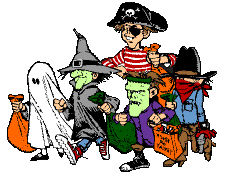
Another cherished Halloween custom is trick-or-treating. This is another one with some Christian origins.
In Celtic times, the inhabitants of the British Isles believed that on the night of October 31, which was their new year's eve, the spirits of those who had died during that year could come back to visit their families. Offerings of food were left by the living for these relatives.
Some donned the clothes of the dead, and begged for the treats from door to door in the village. Sometimes banquets were laid out, after which the people in the guise of the dead were escorted to the edge of town (we still send what we don't want to the edge of town-to the dump).
The Church looked somewhat askance at this custom. But, as the Church did with many pre-Christian customs that we still observe as Christmas rituals, it gave the celebration of the night of October 31st a Christian content.
First All Saints' Day was imposed on November 1st, and made a day of mandatory attendance at Mass. Later, a day to honor all the faithful departed, All Souls' Day was added on November 2nd.
The custom of dressing up in the clothes of the dead and going door-to-door was transformed into the "luck visit" ritual called "going a-souling." Young people would visit, and beg for soul cakes (square cakes of something like raisin bread), sometimes singing souling songs.
If given a soul cake, the visitor would promise to pray for the soul of the donor, or anyone he designated. This custom was, in the 19th century revived and transformed into trick-or-treating.
You will notice a strong resemblence between trick-or-treating and Christmas "luck visits" like carolling, John Canoe, wassailing, the Plough Monday ritual, and the wren boys in Ireland. In England, once Hallowmas was more-or-less replaced with Guy Fawkes Night, and souling fell out of fashion, children used to go door to door to beg "A penny for the Guy?". There was also here in the US, especially in New York, in the 19th century a Thanksgiving Day begging door-to-door ritual which is similar.
They are indeed related customs. Luck or good fortune, in this case in the form of prayers for the soul, are exchanged for gifts of food or drink. Both are new year rituals, with trick-or-treating a reminder that October 31st was new year's eve for the Celts.
Today many Catholic schools have children dress up as saints, and attend Mass on All Saints Day so attired. This is another adaptation of the "luck visit" ritual that is at the root of trick-or-treating. And many children now have two costumes, something spooky for All Hallows' Eve, and a saint's attire for All Hallows.
Why not?

Labels: Hallowmas
The Story Of the Jack-O-Lantern

Many of you will be familiar with this story, but it illustrates the Christian origins of one of the most cherished Halloween customs.
Back in the days after Saint Patrick had converted Ireland, there lived an Irishman named Jack. Now Jack was a notoriously mean, stingy, and hard-drinking reprobate. Jack wanted a drink, but could not afford one. He somehow summoned the Devil, and offered him his soul for a drink. The Devil agreed.
Jack asked for hard cider, and asked the Devil to climb a tree to get apples to make cider from. The Devil climbed up, and sent down some apples. Once Jack had the apples. he quickly carved a cross in the trunk of the tree, making it impossible for the Devil to come down out of the tree. Jack and the Devil agreed that Jack would efface the cross, so that the Devil could come down, and the Devil would never accept Jack's soul into Hell. Jack went off with the cider and laughing in his sleeve.
Jack continued his life of sin. When he finally died, he presented himself at the Gates of Heaven, only to be turned away for being in life too mean, too tight, and too thirsty.
"Well," Jack said, "off to Hell I go." But when he got there, the Devil reminded Jack of their bargain, and refused him. To speed him on his way, the Devil hurled a coal from the fires of Hell at Jack.
Jack had been eating a turnip, and had hollowed it out fairly well. Jack defended himself from the burning coal by putting up the turnip, and caught the coal in it. Since then, using his hollowed out turnip with its coal from the fires of Hell as a lantern, Jack has been wandering the earth in search of a drink and a refuge.
He is known as Jack of the Lantern, or jack-o-lantern.
In Ireland, it was the custom to carve grotesque faces into turnips, and use them as lanterns for going a'souling around Hallowmas.
When the Irish came to America, they found turnips not particularly popular. But the Yankees used pumpkins for everything, including soup tureens, ladles, and storage pots. The Irish found that pumpkins made excellent substitutes for Jack's turnip lantern. That is why we carve pumpkins into jack-o-lanterns to this day.
Labels: Hallowmas
It's Halloween Again
And for many years, this little ditty, that I think I picked up from some Scholastic Books Halloween-themed book of ghost stories back in the 1970s, has been my way of starting off the festivities.
The Ghost's Lament
Woe's me, woe's me
The acorn's not yet fallen from the tree,
That's to grow the wood,
That's to make the cradle,
That's to rock the baby,
That's to grow a man,
That's to release me!

The Ghost's Lament
Woe's me, woe's me
The acorn's not yet fallen from the tree,
That's to grow the wood,
That's to make the cradle,
That's to rock the baby,
That's to grow a man,
That's to release me!

Labels: Hallowmas
Friday At the Foot Of the Cross

Beads of the Crown of Thorns
"The Crown of Thorns is a Diadem of Love."
Though we are not with exact accuracy informed of the real number of thorns that pierced the adorable head of our suffering Lord. yet a pious tradition mentions that they were seventy-two. The truly learned and pious Suarez states that such is the opinion of several Christian writers. From the information that we receive from devout and learned Catholic authors, the Crown of Thorns may have contained more, but not less of these thorns. St. Bernard and St. Anselm affirm that thousands of these sharp thorns pierced our Savior' s adorable Head.
The beads of the Crown of Thorns are prepared on the supposition that they were seventy-two. Hence they are composed of seven decades. The seven usual mysteries for consideration during the recital of the beads are entirely taken from the Gospel, and give the history of the crowning of our dear Lord with thorns. The recitation of these beads is begun in the usual manner, with the addition of two short versicles specifying its object. After announcing the subject for pious reflection, during the respective decade, the Pater Noster and Ave Maria are recited once, then the doxology or Gloria Patri is repeated ten times.
Thus these beads are composed of seven Our Fathers and as many Hail Marys intended to commemorate and honor the seven dolors of the most holy Mother of our Lord, who had a very large share of internal sufferings in the Passion and death of her Divine Son. The seventy Glorias contained in the seven decades, with one at the beginning and another at the end of the Rosary, after the Pater Noster and Ave Maria for the Pope, give seventy-two Glorias in memory of the wounds in the adorable head of our dear Lord and Savior Jesus Christ.
We wish explicitly to state that by this form of prayer it is not intended to fix the number of wounds in the head of our Lord, crowned with thorns, but only to honor and thank Him for His sufferings in the best practical way that we know. The beads of the Crown of Thorns will close with a suitable prayer translated from the Office of the Crown of Thorns approved by the Church. The beads of the ordinary Rosary of the Blessed Virgin Mary may be used instead of those of the Crown of Thorns, until a pair of these can be procured. The only difference will be the addition of two extra decades, and reciting the Gloria Patri in place of the Ave Maria. We give now the detailed form and mysteries of the beads of the Crown of Thorns.
Manner of Reciting the Beads of the Crown of Thorns:
V. Come let us adore Jesus Christ, our King.
R. Crowned with our thorns, wounded by their sting.
O God, come to my assistance.
Lord, make haste to help me.
Glory be to the Father, and to the Son, and to the Holy Ghost.
As it was in the beginning, is now, and ever shall be. Amen.
First Decade
Let us consider that Pilate, to satisfy the people, released unto them Barabbas, and after having scourged Jesus, our Lord, delivered Him up to be crucified. [Mk. 15: 15]
Recite one Our Father, one Hail Mary, followed by ten Glory Bes to the Father. Then say.
V. We venerate, O Lord, thy Crown of Thorns.
R. We meditate, O Jesus, on thy glorious Passion.
Second Decade
Let us consider how the Pagan soldiers led Jesus into the court of the Governor's palace, and called together the whole band. [Mk. 15: 16]
The rest as in the first decade.
Third Decade
Let us consider how the soldiers, having stripped Jesus, put a scarlet cloak about him. [Mt. 27: 28]
The rest as in the first decade.
Fourth Decade
Let us consider how those cruel executioners, platting a crown of thorns, put it on the head of Jesus, and a reed in his right hand. [Mt. 27: 39]
The rest as in the first decade.
Fifth Decade
Let us consider how those malicious men, spitting upon the face of our Lord, took the reed from His hand, and with it struck His adorable head. [Mt. 27: 30]
The rest as in the first decade.
Sixth Decade
Let us consider how those impious men, bending the knee before Jesus, our Lord, mocked Him, saying: Hail, King of the Jews. [Mt. 27: 29]
The rest as in the first decade.
Seventh Decade
Let us consider, in this last decade, how our Lord, Jesus Christ, bearing the Crown of Thorns and the purple garment, was led before the people, and Pilate said to the Jews: Behold the Man. [Jn. 19: 5]
The rest as in the first decade.
Then say:
Our sins, O Lord, have sown the thorns
The points of which Thy head transfix.
Convert our souls, remove our guilt,
And in our hearts Thy thorns infix.
Oh! may all men, Thee, King of Kings,
In faith adore, in worship love;
And in our infallible Pope
Behold thy pledge of truth and hope.
Recite one Pater, Ave and Gloria for the Pope.
Then say:
V. Having platted a crown of thorns,
R. They placed it upon His head.
Let us pray.
Grant we beseech thee, Almighty God, that we, who in rememberance of the Passion of our Lord Jesus Christ, venerate here upon earth His Crown of Thorns, may deserve to be crowned by Him with glory and honor in Heaven, Who liveth and reigneth with Thee and the Holy Ghost, World without end. Amen.
In reciting these beads we may have the following intentions: First decade, to promote this devotion; Second decade for our parents or immediate superiors: Third decade, for our temporal rulers; Fourth decade, for the conversion of all sinners and infidels; Fifth decade, for our pastor or confessor; Sixth decade, for our bishop; Seventh decade, for the Pope.
Source:
The Mystery of the Crown of Thorns, by A Passionist Father, Originally published in 1879; Preserving Christian Publications, New York, 2001.
Labels: Friday At the Foot Of the Cross
Thursday, October 30, 2008
Congratulations
The Philadelphia Phillies won the World Series, after a very long-delayed Game 5 was resumed last night. So the National League came out on top. Brad Lidge closed it out. I knew he was someone to watch out for. The Red Sox are now no longer the reigning World Series Champions. When will they be again? Sigh.
Labels: Boston Red Sox
House of the Seven Gables At Halloween
More On Hell
From SalveMariaRegina.info
"Here you see Hell..."
As Our Lady spoke, she opened her lovely hands, disclosing beneath a sea of fire; and plunged in this fire were the demons and the souls, as if they were red-hot coals, transparent and black or bronze colored; with human forms, which floated about in the conflagration, borne by the flames which issued from it with great clouds of smoke, falling on all sides as sparks fall in great conflagrations -- without weight or equilibrium, among shrieks and groans of sorrow and despair which horrify and cause to shudder with fear.
The devils were distinguished by horrible and loathsome forms of animals frightful and unknown, but transparent like black coals that have turned red-hot.
"Here you see Hell, where the souls of poor sinners go," she said at length. "To save them God wishes to establish in the world the devotion to my Immaculate Heart. If they do what I will tell you, many souls will be saved, and there will be peace.
For many years now, the Modernists have been busy suppressing the doctrine of Hell and eternal punishment. Despite Our Lady's warnings at Fatima, they have succeeded, for the most part, in convincing lax Catholics that they "mustn't frighten the children by talking about Hell". Now the Modernist notion that Hell is merely a bad state of soul is quite common.
Obviously the words and actions of the Mother of God do not fall in with the Modernist ideal, for she, who is the Seat of Wisdom, not only talked about Hell to the three young shepherds, but actually showed them its inhabitants the demons and the damned. True, the children were frightened, and greatly so, but it was with that healthy fear which produced salutary effects in their souls -- amendment of life, zeal for the conversion of sinners, and detachment from worldly pleasures. It is of the utmost importance for us to produce these effects in our souls, by frequent and serious meditation upon the teachings of the Church and her theologians concerning the eternal punishment of the damned.
St. Alphonsus tells us that the Last Things ought to be among the principal subjects of our meditations: "He who often meditates on the four last things -- namely, death, judgement, and the eternity of Hell and Paradise, will not fall into sin. But these truths are not seen with the eye of the body, the soul only perceives them. If they are not meditated on, they vanish from the mind; and then the pleasures of the senses present themselves, and those who do not keep before themselves the eternal truths are easily taken up by them; and this is the reason why so many abandon themselves to vice, and are damned."
Let us consider first the pain of sense. Theologians tell us that all the senses and powers of the damned shall have their appropriate torment; and the more a person has offended God in any particular sense, so much the more shall he be tormented in that sense: "By what things a man sinneth, by the same also he is tormented" (Wisd. 11:17). St. Basil explains that the sight will be tormented by darkness: "The Lord will divide the fire from the light, so that this fire will only perform the office of burning, and not of giving light." St. Thomas says that there will only be sufficient light allowed to to the damned to torment them the more: "Just sufficient to see those things which can torment them."
As for smell, St. Bonaventure says that if the body of one of the damned were driven from Hell, the stench would be enough to destroy all men. And yet some fools say: ''If I go to Hell, I shall not be alone." Miserable beings! the more there are in Hell, the more they suffer.
The hearing shall be tormented by the continual howling and wailing of those despairing wretches. The appetite shall be tormented by hunger: "They shall suffer hunger as dogs" (Ps. 58:15): but never shall they taste even a crumb of bread. So great will be their thirst, that the water of the ocean would not suffice to quench it. The glutton asked for one single drop; but never yet has he obtained it, and never, never shall he have it.
Sacred Scripture repeatedly makes mention of the fires of Hell, which shall be the greatest of the pains of sense: "Depart from Me, ye cursed, into everlasting fire" (Matt. 25:41). The fire of this world is created for our use; but the fire of Hell is created by God expressly to torment. St. Vincent Ferrer says that in comparison with it, our fire is cold. Moreover, the damned shall be sent into the fire; he will be in fire like a fish in water. His body will become all fire, so that the bowels within him will burn, his heart will burn in his bosom, his brain in his head, his blood in his veins, even the marrow in his bones: "Thou shalt make them as an oven of fire."
Abbot Marmion says, furthermore, that the lost soul is given over to the power of the demons. "In Hell, where the damned, abandoned by God, are given entirely into their power, into this exterior darkness, the devils have free play. They cast themselves upon their prey to plague them without respite, to inflict upon them indescribable evils."
But all these pains are as nothing in comparison with the pain of loss; the pain that makes Hell is the pain of having lost God. Abbot Marmion explains it: "The damned soul is torn by two forces: its nature tends, with irresistible passion, towards God, the last end for which it was created, and on the other side, its will, fixed in opposition, rejects God, blasphemes Him and finds its satisfaction in this aversion. Who can describe the torture of this despair?" And St. Thomas says: "The pain of the damned is infinite, because it is the loss of an infinite good."
On account of this eternal loss, the damned prey on themselves by remorse. Have we then, will they say, for such trifling, transitory, and poisonous gratifications, lost Heaven and God, and condemned ourselves to this prison of torments forever? St. Alphonsus tells us: "In many ways will conscience gnaw the heart of the reprobate; but the three most grievous things will be, to reflect upon the trifles for which they have lost their souls; the little they were required to do to be saved; and finally, the great good they have lost."
The eternity of Hell is of faith; it is not a simple opinion, but a truth attested to by God in so many places in Scripture: "And these shall go into everlasting punishment" (Matt. 25:46). "What madness would it be in a man", exclaims St. Alphonsus, "Who, in order to enjoy one day of amusement, should condemn himself to be shut up in a pit for twenty or thirty years! But it is not a question of thirty, of a hundred, of a thousand, nor of a hundred thousand years; it is a question of eternity, of suffering forever the same torments." A devil who dwelt in one obsessed, being asked how long he would have to remain in Hell, replied, in a rage, beating his hand against a chair, 'Forever, forever!'" So great was the terror thus inspired, that many youths of the Roman Seminary, who were there present, made a general confession, and changed their lives at this great sermon of two words -- "forever, forever!" Another devil was asked, since when had he been in Hell, and he replied, "Yesterday -- yesterday!" They exclaimed, 'Thou hast been damned for above five thousand years, and thou sayest yesterday!" Again he replied: "Oh, if you did but know what eternity means, you would well understand that five thousand years are, by comparison, not even a moment."
Blessed shall we be, if after these considerations we reap the fruits of zeal for souls, patience, contrition for our sins, amendment of life, and perseverance in the True Faith. St. Teresa tells us of her vision of Hell: "I am not afraid to repeat that this is one of the most exceptional graces that the Lord has granted to me. It has been of the utmost profit to me." We too, if we realize the terrors of Hell, shall profit and shall make use of the means of salvation.
St. Alphonsus exhorts us, "Pray, pray, never cease to pray; for if you pray, your salvation will be secure; but if you leave off praying, your damnation will be certain." And let it be far from us to ignore the plea of Our Blessed Mother Herself, at Fatima: "Pray -- pray very much. Make sacrifices for sinners. Many souls go to Hell because no one is willing to make sacrifices for them."
Considering the Number of the Lost
by Reverend Alphonsus Muzarelli
"Enter ye in by the narrow gate. For wide is the gate and broad is the way that leads to destruction, and many there are who enter therein. How narrow the gate and strait is the way that leads to life! And few there are that find it!" (Matt. 7:13-14)
Reflecting upon these words of the Son of God; my soul, take a glance into Hell and count the souls that were damned before the coming of Christ. There is Cain. Of two brothers, one is saved, the other is damned.
That multitude is the souls of those who lived at the time of the Deluge. With the exception of one family, almost every person was damned.
There are the inhabitants of Sodom and Gomorrah; the idolaters of the ancient world: Assyrians, Phoenicians, Greeks, and Romans, Babylonians, Egyptians, etc......
And of the Hebrews, most of them were also damned.
You may also count those who were obstinate! How many souls are there who spoke with Jesus Christ, who were with Him, and saw His miracles with their own eyes! Among the vast numbers there are Pilate, Governor of Judea; and Caiphas, the high priest; and Herod, the king; and Judas, the disciple of Jesus Christ; and a thief who died at His side.
Finally, count the number of those who were damned after the coming of the Messiah. See how many souls rebelled against the Gospel, who were too blind to accept miracles, who persecuted the Church; see the philosophers and poets who were of great renown in the world. Look at those Catholics who were damned in spite of the Faith, good inspirations, sermons, and Sacraments. Look, how many princes, bishops, priests, and religious! And at this moment, while you meditate, how many souls are falling into Hell!
And I go about saying: "If all sinners were damned, no man would be left for Paradise!" But, look how many are damned! What is all this to God? What damage is done to Paradise for their absence? O my soul, live with the few if you wish to be saved with them.
CONSIDERATION: Avoid diligently that temptation of the Devil with which he tempted Judas, leading him into the pit of despair, where one no longer prays to the pure and powerful Mother of God, Conqueror of demons. Be convinced that she never abandons her true children, but she cannot aid those who, succumbing to diabolical despair, fail to call upon her in times of trial and temptation.
PRACTICE: Resolve what special devotion you will perform in honor of Mary all your life, and write a solemn promise to fulfill it in order to gain her all-powerful and never-ending assistance in avoiding the flames of Hell.
EJACULATION: Thanks be to thee, O Mother, that I am not now burning in Hell.
"Here you see Hell..."
As Our Lady spoke, she opened her lovely hands, disclosing beneath a sea of fire; and plunged in this fire were the demons and the souls, as if they were red-hot coals, transparent and black or bronze colored; with human forms, which floated about in the conflagration, borne by the flames which issued from it with great clouds of smoke, falling on all sides as sparks fall in great conflagrations -- without weight or equilibrium, among shrieks and groans of sorrow and despair which horrify and cause to shudder with fear.
The devils were distinguished by horrible and loathsome forms of animals frightful and unknown, but transparent like black coals that have turned red-hot.
"Here you see Hell, where the souls of poor sinners go," she said at length. "To save them God wishes to establish in the world the devotion to my Immaculate Heart. If they do what I will tell you, many souls will be saved, and there will be peace.
For many years now, the Modernists have been busy suppressing the doctrine of Hell and eternal punishment. Despite Our Lady's warnings at Fatima, they have succeeded, for the most part, in convincing lax Catholics that they "mustn't frighten the children by talking about Hell". Now the Modernist notion that Hell is merely a bad state of soul is quite common.
Obviously the words and actions of the Mother of God do not fall in with the Modernist ideal, for she, who is the Seat of Wisdom, not only talked about Hell to the three young shepherds, but actually showed them its inhabitants the demons and the damned. True, the children were frightened, and greatly so, but it was with that healthy fear which produced salutary effects in their souls -- amendment of life, zeal for the conversion of sinners, and detachment from worldly pleasures. It is of the utmost importance for us to produce these effects in our souls, by frequent and serious meditation upon the teachings of the Church and her theologians concerning the eternal punishment of the damned.
St. Alphonsus tells us that the Last Things ought to be among the principal subjects of our meditations: "He who often meditates on the four last things -- namely, death, judgement, and the eternity of Hell and Paradise, will not fall into sin. But these truths are not seen with the eye of the body, the soul only perceives them. If they are not meditated on, they vanish from the mind; and then the pleasures of the senses present themselves, and those who do not keep before themselves the eternal truths are easily taken up by them; and this is the reason why so many abandon themselves to vice, and are damned."
Let us consider first the pain of sense. Theologians tell us that all the senses and powers of the damned shall have their appropriate torment; and the more a person has offended God in any particular sense, so much the more shall he be tormented in that sense: "By what things a man sinneth, by the same also he is tormented" (Wisd. 11:17). St. Basil explains that the sight will be tormented by darkness: "The Lord will divide the fire from the light, so that this fire will only perform the office of burning, and not of giving light." St. Thomas says that there will only be sufficient light allowed to to the damned to torment them the more: "Just sufficient to see those things which can torment them."
As for smell, St. Bonaventure says that if the body of one of the damned were driven from Hell, the stench would be enough to destroy all men. And yet some fools say: ''If I go to Hell, I shall not be alone." Miserable beings! the more there are in Hell, the more they suffer.
The hearing shall be tormented by the continual howling and wailing of those despairing wretches. The appetite shall be tormented by hunger: "They shall suffer hunger as dogs" (Ps. 58:15): but never shall they taste even a crumb of bread. So great will be their thirst, that the water of the ocean would not suffice to quench it. The glutton asked for one single drop; but never yet has he obtained it, and never, never shall he have it.
Sacred Scripture repeatedly makes mention of the fires of Hell, which shall be the greatest of the pains of sense: "Depart from Me, ye cursed, into everlasting fire" (Matt. 25:41). The fire of this world is created for our use; but the fire of Hell is created by God expressly to torment. St. Vincent Ferrer says that in comparison with it, our fire is cold. Moreover, the damned shall be sent into the fire; he will be in fire like a fish in water. His body will become all fire, so that the bowels within him will burn, his heart will burn in his bosom, his brain in his head, his blood in his veins, even the marrow in his bones: "Thou shalt make them as an oven of fire."
Abbot Marmion says, furthermore, that the lost soul is given over to the power of the demons. "In Hell, where the damned, abandoned by God, are given entirely into their power, into this exterior darkness, the devils have free play. They cast themselves upon their prey to plague them without respite, to inflict upon them indescribable evils."
But all these pains are as nothing in comparison with the pain of loss; the pain that makes Hell is the pain of having lost God. Abbot Marmion explains it: "The damned soul is torn by two forces: its nature tends, with irresistible passion, towards God, the last end for which it was created, and on the other side, its will, fixed in opposition, rejects God, blasphemes Him and finds its satisfaction in this aversion. Who can describe the torture of this despair?" And St. Thomas says: "The pain of the damned is infinite, because it is the loss of an infinite good."
On account of this eternal loss, the damned prey on themselves by remorse. Have we then, will they say, for such trifling, transitory, and poisonous gratifications, lost Heaven and God, and condemned ourselves to this prison of torments forever? St. Alphonsus tells us: "In many ways will conscience gnaw the heart of the reprobate; but the three most grievous things will be, to reflect upon the trifles for which they have lost their souls; the little they were required to do to be saved; and finally, the great good they have lost."
The eternity of Hell is of faith; it is not a simple opinion, but a truth attested to by God in so many places in Scripture: "And these shall go into everlasting punishment" (Matt. 25:46). "What madness would it be in a man", exclaims St. Alphonsus, "Who, in order to enjoy one day of amusement, should condemn himself to be shut up in a pit for twenty or thirty years! But it is not a question of thirty, of a hundred, of a thousand, nor of a hundred thousand years; it is a question of eternity, of suffering forever the same torments." A devil who dwelt in one obsessed, being asked how long he would have to remain in Hell, replied, in a rage, beating his hand against a chair, 'Forever, forever!'" So great was the terror thus inspired, that many youths of the Roman Seminary, who were there present, made a general confession, and changed their lives at this great sermon of two words -- "forever, forever!" Another devil was asked, since when had he been in Hell, and he replied, "Yesterday -- yesterday!" They exclaimed, 'Thou hast been damned for above five thousand years, and thou sayest yesterday!" Again he replied: "Oh, if you did but know what eternity means, you would well understand that five thousand years are, by comparison, not even a moment."
Blessed shall we be, if after these considerations we reap the fruits of zeal for souls, patience, contrition for our sins, amendment of life, and perseverance in the True Faith. St. Teresa tells us of her vision of Hell: "I am not afraid to repeat that this is one of the most exceptional graces that the Lord has granted to me. It has been of the utmost profit to me." We too, if we realize the terrors of Hell, shall profit and shall make use of the means of salvation.
St. Alphonsus exhorts us, "Pray, pray, never cease to pray; for if you pray, your salvation will be secure; but if you leave off praying, your damnation will be certain." And let it be far from us to ignore the plea of Our Blessed Mother Herself, at Fatima: "Pray -- pray very much. Make sacrifices for sinners. Many souls go to Hell because no one is willing to make sacrifices for them."
Considering the Number of the Lost
by Reverend Alphonsus Muzarelli
"Enter ye in by the narrow gate. For wide is the gate and broad is the way that leads to destruction, and many there are who enter therein. How narrow the gate and strait is the way that leads to life! And few there are that find it!" (Matt. 7:13-14)
Reflecting upon these words of the Son of God; my soul, take a glance into Hell and count the souls that were damned before the coming of Christ. There is Cain. Of two brothers, one is saved, the other is damned.
That multitude is the souls of those who lived at the time of the Deluge. With the exception of one family, almost every person was damned.
There are the inhabitants of Sodom and Gomorrah; the idolaters of the ancient world: Assyrians, Phoenicians, Greeks, and Romans, Babylonians, Egyptians, etc......
And of the Hebrews, most of them were also damned.
You may also count those who were obstinate! How many souls are there who spoke with Jesus Christ, who were with Him, and saw His miracles with their own eyes! Among the vast numbers there are Pilate, Governor of Judea; and Caiphas, the high priest; and Herod, the king; and Judas, the disciple of Jesus Christ; and a thief who died at His side.
Finally, count the number of those who were damned after the coming of the Messiah. See how many souls rebelled against the Gospel, who were too blind to accept miracles, who persecuted the Church; see the philosophers and poets who were of great renown in the world. Look at those Catholics who were damned in spite of the Faith, good inspirations, sermons, and Sacraments. Look, how many princes, bishops, priests, and religious! And at this moment, while you meditate, how many souls are falling into Hell!
And I go about saying: "If all sinners were damned, no man would be left for Paradise!" But, look how many are damned! What is all this to God? What damage is done to Paradise for their absence? O my soul, live with the few if you wish to be saved with them.
CONSIDERATION: Avoid diligently that temptation of the Devil with which he tempted Judas, leading him into the pit of despair, where one no longer prays to the pure and powerful Mother of God, Conqueror of demons. Be convinced that she never abandons her true children, but she cannot aid those who, succumbing to diabolical despair, fail to call upon her in times of trial and temptation.
PRACTICE: Resolve what special devotion you will perform in honor of Mary all your life, and write a solemn promise to fulfill it in order to gain her all-powerful and never-ending assistance in avoiding the flames of Hell.
EJACULATION: Thanks be to thee, O Mother, that I am not now burning in Hell.
Labels: Hallowmas
Wednesday, October 29, 2008
It Started In Vermont and Hawaii
Then Massachusetts went all the way. Then California. Now Connecticut falls into line on the slippery slope to Hell.
Labels: Any Serious Catholic Who Isn't A Very Conservative Republican...
The Awful Fate Of the Damned
As we draw near to Hallowmas, we think of the dead. First, our attention is drawn to the fate of the damned.

From The Summa Theologica, by St. Thomas Aquinas

Article 1. Whether in hell the damned are tormented by the sole punishment of fire?
Objection 1. It would seem that in hell the damned are tormented by the sole punishment of fire; because Matthew 25:41, where their condemnation is declared, mention is made of fire only, in the words: "Depart from Me, you cursed, into everlasting fire."
Objection 2. Further, even as the punishment of purgatory is due to venial sin, so is the punishment of hell due to mortal sin. Now no other punishment but that of fire is stated to be in purgatory, as appears from the words of 1 Corinthians 3:13: "The fire shall try every man's work, of what sort it is." Therefore neither in hell will there be a punishment other than of fire.
Objection 3. Further, variety of punishment affords a respite, as when one passes from heat to cold. But we can admit no respite in the damned. Therefore there will not be various punishments, but that of fire alone.
On the contrary, It is written (Psalm 10:7): "Fire and brimstone and storms of winds shall be the portion of their cup."
Further, it is written (Job 24:19): "Let him pass from the snow waters to excessive heat."
I answer that, According to Basil (Homilia vi in Hexaemeron and Hom. i in Ps. 38), at the final cleansing of the world, there will be a separation of the elements, whatever is pure and noble remaining above for the glory of the blessed, and whatever is ignoble and sordid being cast down for the punishment of the damned: so that just as every creature will be to the blessed a matter of joy, so will all the elements conduce to the torture of the damned, according to Wisdom 5:21, "the whole world will fight with Him against the unwise." This is also becoming to Divine justice, that whereas they departed from one by sin, and placed their end in material things which are many and various, so should they be tormented in many ways and from many sources.
Reply to Objection 2. It is because fire is most painful, through its abundance of active force, that the name of fire is given to any torment if it be intense.
Reply to Objection 2. The punishment of purgatory is not intended chiefly to torment but to cleanse: wherefore it should be inflicted by fire alone which is above all possessed of cleansing power. But the punishment of the damned is not directed to their cleansing. Consequently the comparison fails.
Reply to Objection 3. The damned will pass from the most intense heat to the most intense cold without this giving them any respite: because they will suffer from external agencies, not by the transmutation of their body from its original natural disposition, and the contrary passion affording a respite by restoring an equable or moderate temperature, as happens now, but by a spiritual action, in the same way as sensible objects act on the senses being perceived by impressing the organ with their forms according to their spiritual and not their material being.
Article 2. Whether the worm of the damned is corporeal?
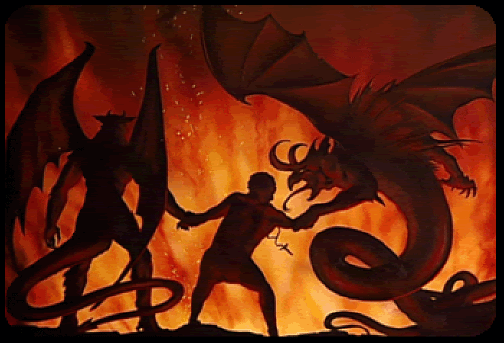
Objection 1. It would seem that the worm by which the damned are tormented is corporeal, because flesh cannot be tormented by a spiritual worm. Now the flesh of the damned will be tormented by a worm: "He will give fire and worms into their flesh" (Judith 16:21), and: "The vengeance on the flesh of the ungodly is fire and worms" (Sirach 7:19). Therefore that worm will be corporeal.
Objection 2. Further, Augustine says (De Civ. Dei xxi, 9): . . . "Both, namely fire and worm, will be the punishment of the body." Therefore, etc.
On the contrary, Augustine says (De Civ. Dei xx, 22): "The unquenchable fire and the restless worm in the punishment of the damned are explained in various ways by different persons. Some refer both to the body, some, both to the soul: others refer the fire, in the literal sense, to the body, the worm to the soul metaphorically: and this seems the more probable."
I answer that, After the day of judgment, no animal or mixed body will remain in the renewed world except only the body of man, because the former are not directed to incorruption [Cf. 91, 5], nor after that time will there be generation or corruption. Consequently the worm ascribed to the damned must be understood to be not of a corporeal but of a spiritual nature: and this is the remorse of conscience, which is called a worm because it originates from the corruption of sin, and torments the soul, as a corporeal worm born of corruption torments by gnawing.
Reply to Objection 1. The very souls of the damned are called their flesh for as much as they were subject to the flesh. Or we may reply that the flesh will be tormented by the spiritual worm, according as the afflictions of the soul overflow into the body, both here and hereafter.
Reply to Objection 2. Augustine speaks by way of comparison. For he does not wish to assert absolutely that this worm is material, but that it is better to say that both are to be understood materially, than that both should be understood only in a spiritual sense: for then the damned would suffer no bodily pain. This is clear to anyone that examines the context of his words in this passage.
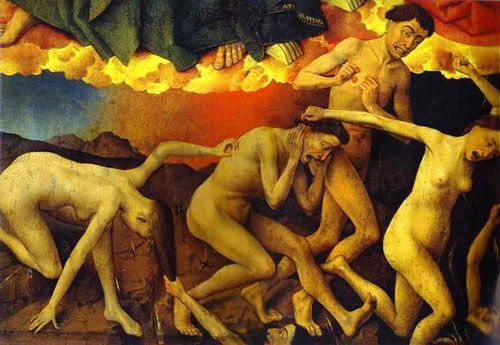
Article 3. Whether the weeping of the damned will be corporeal?
Objection 1. It would seem that the weeping of the damned will be corporeal. For a gloss on Luke 13:28, "There will be weeping," says that "the weeping with which our Lord threatens the wicked is a proof of the resurrection of the body." But this would not be the case if that weeping were merely spiritual. Therefore, etc.
Objection 2. Further, the pain of the punishment corresponds to the pleasure of the sin, according to Apocalypse 18:7: "As much as she hath glorified herself and lived in delicacies, so much torment and sorrow give ye to her." Now sinners had internal and external pleasure in their sin. Therefore they will also have external weeping.
On the contrary, Corporeal weeping results from dissolving into tears. Now there cannot be a continual dissolution from the bodies of the damned, since nothing is restored to them by food; for everything finite is consumed if something be continually taken from it. Therefore the weeping of the damned will not be corporeal.
I answer that, Two things are to be observed in corporeal weeping. One is the resolution of tears: and as to this corporeal weeping cannot be in the damned, since after the day of judgment, the movement of the first movable being being at an end, there will be neither generation, nor corruption, nor bodily alteration: and in the resolution of tears that humor needs to be generated which is shed forth in the shape of tears. Wherefore in this respect it will be impossible for corporeal weeping to be in the damned. The other thing to be observed in corporeal weeping is acertain commotion and disturbance of the head and eyes, and in this respect weeping will be possible in the damned after the resurrection: for the bodies of the damned will be tormented not only from without, but also from within, according as the body is affected at the instance of the soul's passion towards good or evil. In this sense weeping is a proof of the body's resurrection, and corresponds to the pleasure of sin, experienced by both soul and body.
This suffices for the Replies to the Objections.

Article 4. Whether the damned are in material darkness?
Objection 1. It would seem that the damned are not in material darkness. For commenting on Job 10:22, "But everlasting horror dwelleth," Gregory says (Moral. ix): "Although that fire will give no light for comfort, yet, that it may torment the more it does give light for a purpose, for by the light of its flame the wicked will see their followers whom they have drawn thither from the world." Therefore the darkness there is not material.
Objection 2. Further, the damned see their own punishment, for this increases their punishment. But nothing is seen without light. Therefore there is no material darkness there.
Objection 3. Further, there the damned will have the power of sight after being reunited to their bodies. But this power would be useless to them unless they see something. Therefore, since nothing is seen unless it be in the light, it would seem that they are not in absolute darkness.
On the contrary, It is written (Matthew 22:13): "Bind his hands and his feet, and cast him into the exterior darkness." Commenting on these words Gregory says (Moral. ix): If this fire gave any light, "he would by no means be described as cast into exterior darkness."
Further, Basil says (Hom. i in Ps. 28:7, "The voice of the Lord divideth the flame of fire") that "by God's might the brightness of the fire will be separated from its power of burning, so that its brightness will conduce to the joy of the blessed, and the heat of the flame to the torment of the damned." Therefore the damned will be in material darkness.
Other points relating to the punishment of the damned have been decided above (Article 86).
I answer that, The disposition of hell will be such as to be adapted to the utmost unhappiness of the damned. Wherefore accordingly both light and darkness are there, in so far as they are most conducive to the unhappiness of the damned. Now seeing is in itself pleasant for, as stated in Metaph. i, "the sense of sight is most esteemed, because thereby many things are known."
Yet it happens accidentally that seeing is painful, when we see things that are hurtful to us, or displeasing to our will. Consequently in hell the place must be so disposed for seeing as regards light and darkness, that nothing be seen clearly, and that only such things be dimly seen as are able to bring anguish to the heart. Wherefore, simply speaking, the place is dark. Yet by Divine disposition, there is a certain amount of light, as much as suffices for seeing those things which are capable of tormenting the soul. The natural situation of the place is enough for this, since in the centre of the earth, where hell is said to be, fire cannot be otherwise than thick and cloudy, and reeky as it were.
Some hold that this darkness is caused by the massing together of the bodies of the damned, which will so fill the place of hell with their numbers, that no air will remain, so that there will be no translucid body that can be the subject of light and darkness, except the eyes of the damned, which will be darkened utterly.
This suffices for the Replies to the Objections.

Article 5. Whether the fire of hell will be corporeal?
Objection 1. It would seem that the fire of hell whereby the bodies of the damned will be tormented will not be corporeal. For Damascene says (De Fide Orth. iv): The devil, and "demons, and his men" [Cf. 2 Thessalonians 2:3: "And the man of sin be revealed, the son of perdition."], namely Antichrist, "together with the ungodly and sinners will be cast into everlasting fire, not material fire, such as that which we have, but such as God knoweth." Now everything corporeal is material. Therefore the fire of hell will not be corporeal.
Objection 2. Further, the souls of the damned when severed from their bodies are cast into hell fire. But Augustine says (Gen. ad lit. xii, 32): "In my opinion the place to which the soul is committed after death is spiritual and not corporeal." Therefore, etc.
Objection 3. Further, corporeal fire in the mode of its action does not follow the mode of guilt in the person who is burned at the stake, rather does it follow the mode of humid and dry: for in the same corporeal fire we see both good and wicked suffer. But the fire of hell, in its mode of torture or action, follows the mode of guilt in the person punished; wherefore Gregory says (Dial. iv, 63): "There is indeed but one hell fire, but it does not torture all sinners equally. For each one will suffer as much pain according as his guilt deserves." Therefore this fire will not be corporeal.
On the contrary, He says (Dial. iv, 29): "I doubt not that the fire of hell is corporeal, since it is certain that bodies are tortured there."
Further, it is written (Wisdom 5:21): "The . . . world shall fight . . . against the unwise." But the whole world would not fight against the unwise if they were punished with a spiritual and not a corporeal punishment. Therefore they will be punished with a corporeal fire.
I answer that, There have been many opinions about the fire of hell. For some philosophers, as Avicenna, disbelieving in the resurrection, thought that the soul alone would be punished after death. And as they considered it impossible for the soul, being incorporeak, to be punished with a corporeal fire, they denied that the fire whereby the wicked are punished is corporeal, and pretended that all statements as to souls being punished in future after death by any corporeal means are to be taken metaphorically. For just as the joy and happiness of good souls will not be about any corporeal object, but about something spiritual, namely the attainment of their end, so will the torment of the wicked be merely spiritual, in that they will be grieved at being separated from their end, the desire whereof is in them by nature. Wherefore, just as all descriptions of the soul's delight after death that seem to denote bodily pleasure--for instance, that they are refreshed, that they smile, and so forth--must be taken metaphorically, so also are all such descriptions of the soul's suffering as seem to imply bodily punishment--for instance, that they burn in fire, or suffer from the stench, and so forth. For as spiritual pleasure and pain are unknown to the majority, these things need to be declared under the figure of corporeal pleasures and pains, in order thatmen may be moved the more to the desire or fear thereof. Since, however, in the punishment of the damned there will be not only pain of loss corresponding to the aversion that was in their sin, but also pain of sense corresponding to the conversion, it follows that it is not enough to hold the above manner of punishment. For this reason Avicenna himself (Met. ix) added another explanation, by saying that the souls of the wicked are punished after death, not by bodies but by images of bodies; just as in a dream it seems to a man that he is suffering various pains on account of such like images being in his imagination. Even Augustine seems to hold this kind of punishment (Gen. ad lit. xii, 32), as is clear from the text. But this would seem an unreasonable statement. For the imagination is a power that makes use of a bodily organ: so that it is impossible for such visions of the imagination to occur in the soul separated from the body, as in the soul of the dreamer. Wherefore Avicenna also that he might avoid this difficulty, said that the soul separated from the body uses as an organ some part of the heavenly body, to which the human body needs to be conformed, in order to be perfected by the rational soul, which is like the movers of the heavenly body--thus following somewhat the opinion of certain philosophers of old, who maintained that souls return to the stars that are their compeers. But this is absolutely absurd according to the Philosopher's teaching, since the soul uses a definite bodily organ, even as art uses definite instruments, so that it cannot pass from one body to another, as Pythagoras is stated (De Anima i, text. 53) to have maintained. As to the statement of Augustine we shall say below how it is to be answered (ad 2). However, whatever we may say of the fire that torments the separated souls, we must admit that the fire which will torment the bodies of the damned after the resurrection is corporeal, since one cannot fittingly apply a punishment to a body unless that punishment itself be bodily. Wherefore Gregory (Dial. iv) proves the fire of hell to be corporeal from the very fact that the wicked will be cast thither after the resurrection. Again Augustine, as quoted in the text of Sentent. iv, D, 44, clearly admits (De Civ. Dei xxi, 10) that the fire by which the bodies are tormented is corporeal. And this is the point at issue for the present. We have said elsewhere (70, 3) how the souls of the damned are punished by this corporeal fire.
Reply to Objection 1. Damascene does not absolutely deny that this fire is material, but that it is material as our fire, since it differs from ours in some of its properties. We may also reply that since that fire does not alter bodies as to their matter, but acts on them for their punishment by a kind of spiritual action, it is for this reason that it is stated not to be material, not as regards its substance, but as to its punitive effect on bodies and, still more, on souls.
Reply to Objection 2. The assertion of Augustine may be taken in this way, that the place whither souls are conveyed after death be described as incorporeak, in so far as the soul is there, not corporeally, i.e. as bodies are in a place, but in some other spiritual way, as angels are in a place. Or we may reply that Augustine is expressing an opinion without deciding the point, as he often does in those books.
Reply to Objection 3. That fire will be the instrument of Divine justice inflicting punishment. Now an instrument acts not only by its own power and in its own way, but also by the power of the principal agent, and as directed thereby. Wherefore although fire is not able, of its own power, to torture certain persons more or less, according to the measure of sin, it is able to do so nevertheless in so far as its action is regulated by the ordering of Divine justice: even so the fire of the furnace is regulated by the forethought of the smith, according as the effect of his art requires.
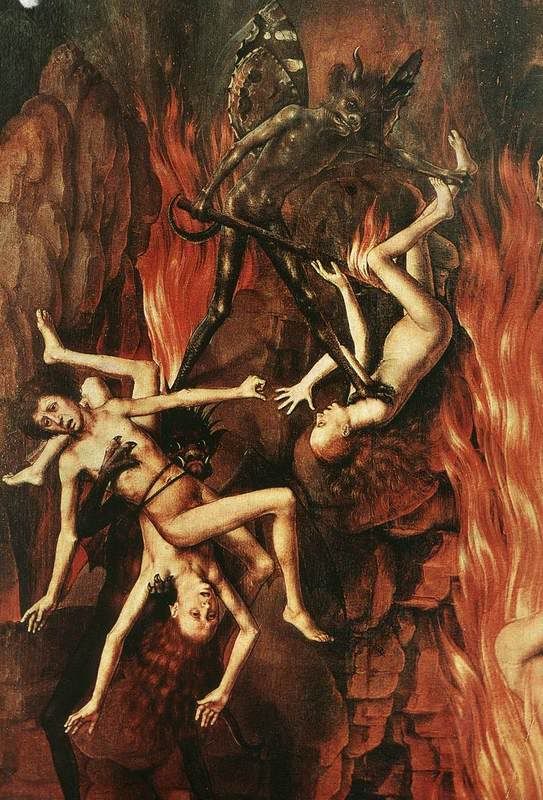
Article 6. Whether the fire of hell is of the same species as ours?
Objection 1. It would seem that this fire is not of the same species as the corporeal fire which we see. For Augustine says (De Civ. Dei xx, 16): "In my opinion no man knows of what kind is the everlasting fire, unless the Spirit of God has revealed it to anyone." But all or nearly all know the nature of this fire of ours. Therefore that fire is not of the same species as this.
Objection 2. Further, Gregory commenting on Job 10:26, "A fire that is not kindled shall devour him," says (Moral. xv): "Bodily fire needs bodily fuel in order to become fire; neither can it be except by being kindled, nor live unless it be renewed. On the other hand the fire of hell, since it is a bodily fire, and burns in a bodily way the wicked cast therein, is neither kindled by human endeavor, nor kept alive with fuel, but once created endures unquenchably; at one and the same time it needs no kindling, and lacks not heat." Therefore it is not of the same nature as the fire that we see.
Objection 3. Further, the everlasting and the corruptible differ essentially, since they agree not even in genus, according to the Philosopher (Metaph. x). But this fire of ours is corruptible, whereas the other is everlasting: "Depart from Me, you cursed, into everlasting fire" (Matthew 25:41). Therefore they are not of the same nature.
Objection 4. Further, it belongs to the nature of this fire of ours to give light. But the fire of hell gives no light, hence the saying of Job 18:5: "Shall not the light of the wicked be extinguished?" Therefore . . . as above.
On the contrary, According to the Philosopher (Topic. i, 6), "every water is of the same species as every other water." Therefore in like manner every fire is of the same species as every other fire.
Further, it is written (Wisdom 11:17): "By what things a man sinneth by the same also he is tormented." Now men sin by the sensible things of this world. Therefore it is just that they should be punished by those same things.
I answer that, As stated in Meteor. iv, 1 fire has other bodies for its matter, for the reason that of all the elements it has the greatest power of action. Hence fire is found under two conditions: in its own matter, as existing in its own sphere, and in a strange matter, whether of earth, as in burning coal, or of air as in the flame. Under whatever conditions however fire be found, it is always of the same species, so far as the nature of fire is concerned, but there may be a difference of species as to the bodies which are the matter of fire. Wherefore flame and burning coal differ specifically, and likewise burning wood and red-hot iron; nor does it signify, as to this particular point, whether they be kindled by force, as in the case of iron, or by a natural intrinsic principle, as happens with sulphur. Accordingly it is clear that the fire of hell is of the same species as the fire we have, so far as the nature of fire is concerned. But whether that fire subsists in its proper matter, or if it subsists in a strange matter, what that matter may be, we know not. And in this way it may differ specifically from the fire we have, considered materially. It has, however, certain properties differing from our fire, for instance that it needs no kindling, nor is kept alive by fuel. But the differences do not argue a difference of species as regards the nature of the fire.
Reply to Objection 1. Augustine is speaking of that fire with regard to its matter, and not with regard to its nature.
Reply to Objection 2. This fire of ours is kept alive with fuel, and is kindled by man, because it is introduced into a foreign matter by art and force. But that other fire needs no fuel to keep it alive, because either it subsists in its own matter, or is in a foreign matter, not by force but by nature from an intrinsic principle. Wherefore it is kindled not by man but by God, Who fashioned its nature. This is the meaning of the words of Isaias (30:33): "The breath of the Lord is as a torrent of brimstone kindling it."
Reply to Objection 3. Even as the bodies of the damned will be of the same species as now, although now they are corruptible, whereas then they will be incorruptible, both by the ordering of Divine justice, and on account of the cessation of the heavenly movement, so is it with the fire of hell whereby those bodies will be punished.
Reply to Objection 4. To give light does not belong to fire according to any mode of existence, since in its own matter it gives no light; wherefore it does not shine in its own sphere according to the philosophers: and in like manner in certain foreign matters it does not shine, as when it is in an opaque earthly substance such as sulphur. The same happens also when its brightness is obscured by thick smoke. Wherefore that the fire of hell gives no light is not sufficient proof of its being of a different species.
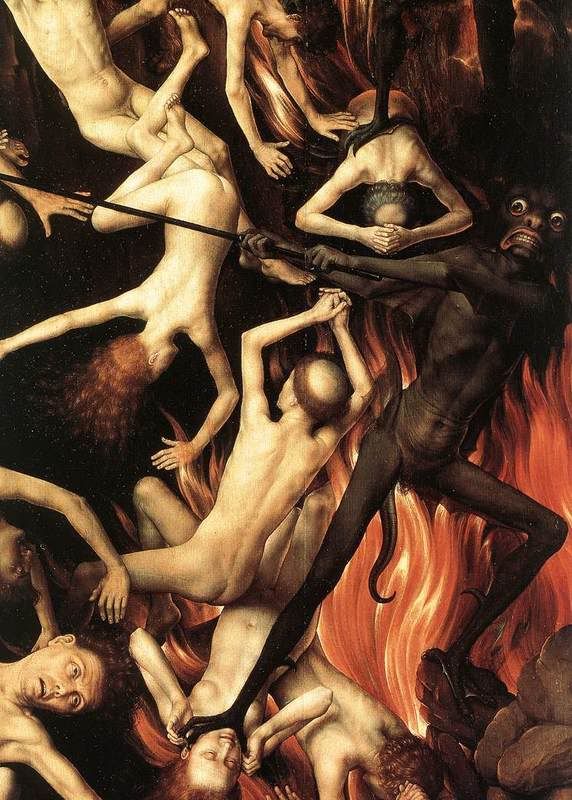
Article 7. Whether the fire of hell is beneath the earth?
Objection 1. It would seem that this fire is not beneath the earth. For it is said of the damned (Job 18:18), "And God shall remove him out of the globe [Douay: 'world']." Therefore the fire whereby the damned will be punished is not beneath the earth but outside the globe.
Objection 2. Further, nothing violent or accidental can be everlasting. But this fire will be in hell for ever. Therefore it will be there, not by force but naturally. Now fire cannot be under the earth save by violence. Therefore the fire of hell is not beneath the earth.
Objection 3. Further, after the day of judgment the bodies of all the damned will be tormented in hell. Now those bodies will fill a place. Consequently, since the multitude of the damned will be exceeding great, for "the number of fools is infinite" (Ecclesiastes 1:15), the space containing that fire must also be exceeding great. But it would seem unreasonable to say that there is so great a hollow within the earth, since all the parts of the earth naturally tend to the center. Therefore that fire will not be beneath the earth.
Objection 4. Further, "By what things a man sinneth, by the same also he is tormented" (Wisdom 11:17). But the wicked have sinned on the earth. Therefore the fire that punishes them should not be under the earth.
On the contrary, It is written (Isaiah 14:9): "Hell below was in an uproar to meet Thee at Thy coming." Therefore the fire of hell is beneath us.
Further, Gregory says (Dial. iv): "I see not what hinders us from believing that hell is beneath the earth."
Further, a gloss on Jonah 2:4, "Thou hast cast me forth . . . into the heart of the sea," says, "i.e. into hell," and in the Gospel (Matthew 12:40) the words "in the heart of the earth" have the same sense, for as the heart is in the middle of an animal, so is hell supposed to be in the middle of the earth.
I answer that, As Augustine says (De Civ. Dei xv, 16), "I am of opinion that no one knows in what part of the world hell is situated, unless the Spirit of God has revealed this to some one." Wherefore Gregory (Dial. iv) having been questioned on this point answers: "About this matter I dare not give a rash decision. For some have deemed hell to be in some part of the earth's surface; others think it to be beneath the earth." He shows the latter opinion to be the more probable for two reasons. First from the very meaning of the word. These are his words: "If we call it the nether regions (infernus [TheLatin for ' hell']), for the reason that it is beneath us [inferius], what earth is in relation to heaven, such should be hell in relation to earth." Secondly, from the words of Revelation 5:3: "No man was able, neither in heaven, nor on earth, nor under the earth, to open the book": where the words "in heaven" refer to the angels, "on earth" to men living in the body, and "under the earth" to souls in hell. Augustine too (Gen. ad lit. xii, 34) seems to indicate two reasons for the congruity of hell being under the earth. One is that "whereas the souls of the departed sinned through love of the flesh, they should be treated as the dead flesh is wont to be treated, by being buried beneath the earth." The other is that heaviness is to the body what sorrow is to thespirit, and joy (of spirit) is as lightness (of body). Wherefore "just as in reference to the body, all the heavier things are beneath the others, if they be placed in order of gravity, so in reference to thespirit, the lower place is occupied by whatever is more sorrowful"; and thus even as the empyrean is a fitting place for the joy of the elect, so the lowest part of the earth is a fitting place for the sorrow of the damned. Nor does it signify that Augustine (De Civ. Dei xv, 16) says that "hell is stated or believed to be under the earth," because he withdraws this (Retract. ii, 29) where he says: "Methinks I should have said that hell is beneath the earth, rather than have given the reason why it is stated or believed to be under the earth." However, some philosophers have maintained that hell is situated beneath the terrestrial orb, but above the surface of the earth, on that part which is opposite to us. This seems to have been the meaning of Isidore when he asserted that "the sun and the moon will stop in the place wherein they were created, lest the wicked should enjoy this light in the midst of their torments." But this is no argument, if we assert that hell is under the earth. We have already stated how these words may be explained (91, 2).
Pythagoras held the place of punishment to be in a fiery sphere situated, according to him, in the middle of the whole world: and he called it the prison-house of Jupiter as Aristotle relates (De Coelo et Mundo ii). It is, however, more in keeping with Scripture to say that it is beneath the earth.
Reply to Objection 1. The words of Job, "God shall remove him out of the globe," refer to the surface of the earth ["De orbe terrarum," which might be rendered "from the land of the living."], i.e. from this world. This is how Gregory expounds it (Moral. xiv) where he says: "He is removed from the globe when, at the coming of the heavenly judge, he is taken away from this world wherein he now prides himself in his wickedness." Nor does globe here signify the universe, as though the place of punishment were outside the whole universe.
Reply to Objection 2. Fire continues in that place for all eternity by the ordering of Divine justice although according to its nature an element cannot last for ever outside its own place, especially if things were to remain in this state of generation and corruption. The fire there will be of the very greatest heat, because its heat will be all gathered together from all parts, through being surrounded on all sides by the cold of the earth.
Reply to Objection 3. Hell will never lack sufficient room to admit the bodies of the damned: since hell is accounted one of the three things that "never are satisfied" (Proverbs 30:15-16). Nor is it unreasonable that God's power should maintain within the bowels of the earth a hollow great enough to contain all the bodies of the damned.
Reply to Objection 4. It does not follow of necessity that "by what things a man sinneth, by the same also he is tormented," except as regards the principal instruments of sin: for as much as man having sinned in soul and body will be punished in both. But it does not follow that a man will be punished in the very place where he sinned, because the place due to the damned is other from that due to wayfarers. We may also reply that these words refer to the punishments inflicted on man on the way: according as each sin has its corresponding punishment, since "inordinate love is its own punishment," as Augustine states (Confess. i, 12).
The Summa Theologica of St. Thomas Aquinas
Second and Revised Edition, 1920
Literally translated by Fathers of the English Dominican Province
Online Edition Copyright © 2008 by Kevin Knight
Nihil Obstat. F. Innocentius Apap, O.P., S.T.M., Censor. Theol.
Imprimatur. Edus. Canonicus Surmont, Vicarius Generalis. Westmonasterii.
APPROBATIO ORDINIS
Nihil Obstat. F. Raphael Moss, O.P., S.T.L. and F. Leo Moore, O.P., S.T.L.
Imprimatur. F. Beda Jarrett, O.P., S.T.L., A.M., Prior Provincialis Angliæ
MEMENTO MORI

From The Summa Theologica, by St. Thomas Aquinas

Article 1. Whether in hell the damned are tormented by the sole punishment of fire?
Objection 1. It would seem that in hell the damned are tormented by the sole punishment of fire; because Matthew 25:41, where their condemnation is declared, mention is made of fire only, in the words: "Depart from Me, you cursed, into everlasting fire."
Objection 2. Further, even as the punishment of purgatory is due to venial sin, so is the punishment of hell due to mortal sin. Now no other punishment but that of fire is stated to be in purgatory, as appears from the words of 1 Corinthians 3:13: "The fire shall try every man's work, of what sort it is." Therefore neither in hell will there be a punishment other than of fire.
Objection 3. Further, variety of punishment affords a respite, as when one passes from heat to cold. But we can admit no respite in the damned. Therefore there will not be various punishments, but that of fire alone.
On the contrary, It is written (Psalm 10:7): "Fire and brimstone and storms of winds shall be the portion of their cup."
Further, it is written (Job 24:19): "Let him pass from the snow waters to excessive heat."
I answer that, According to Basil (Homilia vi in Hexaemeron and Hom. i in Ps. 38), at the final cleansing of the world, there will be a separation of the elements, whatever is pure and noble remaining above for the glory of the blessed, and whatever is ignoble and sordid being cast down for the punishment of the damned: so that just as every creature will be to the blessed a matter of joy, so will all the elements conduce to the torture of the damned, according to Wisdom 5:21, "the whole world will fight with Him against the unwise." This is also becoming to Divine justice, that whereas they departed from one by sin, and placed their end in material things which are many and various, so should they be tormented in many ways and from many sources.
Reply to Objection 2. It is because fire is most painful, through its abundance of active force, that the name of fire is given to any torment if it be intense.
Reply to Objection 2. The punishment of purgatory is not intended chiefly to torment but to cleanse: wherefore it should be inflicted by fire alone which is above all possessed of cleansing power. But the punishment of the damned is not directed to their cleansing. Consequently the comparison fails.
Reply to Objection 3. The damned will pass from the most intense heat to the most intense cold without this giving them any respite: because they will suffer from external agencies, not by the transmutation of their body from its original natural disposition, and the contrary passion affording a respite by restoring an equable or moderate temperature, as happens now, but by a spiritual action, in the same way as sensible objects act on the senses being perceived by impressing the organ with their forms according to their spiritual and not their material being.
Article 2. Whether the worm of the damned is corporeal?

Objection 1. It would seem that the worm by which the damned are tormented is corporeal, because flesh cannot be tormented by a spiritual worm. Now the flesh of the damned will be tormented by a worm: "He will give fire and worms into their flesh" (Judith 16:21), and: "The vengeance on the flesh of the ungodly is fire and worms" (Sirach 7:19). Therefore that worm will be corporeal.
Objection 2. Further, Augustine says (De Civ. Dei xxi, 9): . . . "Both, namely fire and worm, will be the punishment of the body." Therefore, etc.
On the contrary, Augustine says (De Civ. Dei xx, 22): "The unquenchable fire and the restless worm in the punishment of the damned are explained in various ways by different persons. Some refer both to the body, some, both to the soul: others refer the fire, in the literal sense, to the body, the worm to the soul metaphorically: and this seems the more probable."
I answer that, After the day of judgment, no animal or mixed body will remain in the renewed world except only the body of man, because the former are not directed to incorruption [Cf. 91, 5], nor after that time will there be generation or corruption. Consequently the worm ascribed to the damned must be understood to be not of a corporeal but of a spiritual nature: and this is the remorse of conscience, which is called a worm because it originates from the corruption of sin, and torments the soul, as a corporeal worm born of corruption torments by gnawing.
Reply to Objection 1. The very souls of the damned are called their flesh for as much as they were subject to the flesh. Or we may reply that the flesh will be tormented by the spiritual worm, according as the afflictions of the soul overflow into the body, both here and hereafter.
Reply to Objection 2. Augustine speaks by way of comparison. For he does not wish to assert absolutely that this worm is material, but that it is better to say that both are to be understood materially, than that both should be understood only in a spiritual sense: for then the damned would suffer no bodily pain. This is clear to anyone that examines the context of his words in this passage.

Article 3. Whether the weeping of the damned will be corporeal?
Objection 1. It would seem that the weeping of the damned will be corporeal. For a gloss on Luke 13:28, "There will be weeping," says that "the weeping with which our Lord threatens the wicked is a proof of the resurrection of the body." But this would not be the case if that weeping were merely spiritual. Therefore, etc.
Objection 2. Further, the pain of the punishment corresponds to the pleasure of the sin, according to Apocalypse 18:7: "As much as she hath glorified herself and lived in delicacies, so much torment and sorrow give ye to her." Now sinners had internal and external pleasure in their sin. Therefore they will also have external weeping.
On the contrary, Corporeal weeping results from dissolving into tears. Now there cannot be a continual dissolution from the bodies of the damned, since nothing is restored to them by food; for everything finite is consumed if something be continually taken from it. Therefore the weeping of the damned will not be corporeal.
I answer that, Two things are to be observed in corporeal weeping. One is the resolution of tears: and as to this corporeal weeping cannot be in the damned, since after the day of judgment, the movement of the first movable being being at an end, there will be neither generation, nor corruption, nor bodily alteration: and in the resolution of tears that humor needs to be generated which is shed forth in the shape of tears. Wherefore in this respect it will be impossible for corporeal weeping to be in the damned. The other thing to be observed in corporeal weeping is acertain commotion and disturbance of the head and eyes, and in this respect weeping will be possible in the damned after the resurrection: for the bodies of the damned will be tormented not only from without, but also from within, according as the body is affected at the instance of the soul's passion towards good or evil. In this sense weeping is a proof of the body's resurrection, and corresponds to the pleasure of sin, experienced by both soul and body.
This suffices for the Replies to the Objections.

Article 4. Whether the damned are in material darkness?
Objection 1. It would seem that the damned are not in material darkness. For commenting on Job 10:22, "But everlasting horror dwelleth," Gregory says (Moral. ix): "Although that fire will give no light for comfort, yet, that it may torment the more it does give light for a purpose, for by the light of its flame the wicked will see their followers whom they have drawn thither from the world." Therefore the darkness there is not material.
Objection 2. Further, the damned see their own punishment, for this increases their punishment. But nothing is seen without light. Therefore there is no material darkness there.
Objection 3. Further, there the damned will have the power of sight after being reunited to their bodies. But this power would be useless to them unless they see something. Therefore, since nothing is seen unless it be in the light, it would seem that they are not in absolute darkness.
On the contrary, It is written (Matthew 22:13): "Bind his hands and his feet, and cast him into the exterior darkness." Commenting on these words Gregory says (Moral. ix): If this fire gave any light, "he would by no means be described as cast into exterior darkness."
Further, Basil says (Hom. i in Ps. 28:7, "The voice of the Lord divideth the flame of fire") that "by God's might the brightness of the fire will be separated from its power of burning, so that its brightness will conduce to the joy of the blessed, and the heat of the flame to the torment of the damned." Therefore the damned will be in material darkness.
Other points relating to the punishment of the damned have been decided above (Article 86).
I answer that, The disposition of hell will be such as to be adapted to the utmost unhappiness of the damned. Wherefore accordingly both light and darkness are there, in so far as they are most conducive to the unhappiness of the damned. Now seeing is in itself pleasant for, as stated in Metaph. i, "the sense of sight is most esteemed, because thereby many things are known."
Yet it happens accidentally that seeing is painful, when we see things that are hurtful to us, or displeasing to our will. Consequently in hell the place must be so disposed for seeing as regards light and darkness, that nothing be seen clearly, and that only such things be dimly seen as are able to bring anguish to the heart. Wherefore, simply speaking, the place is dark. Yet by Divine disposition, there is a certain amount of light, as much as suffices for seeing those things which are capable of tormenting the soul. The natural situation of the place is enough for this, since in the centre of the earth, where hell is said to be, fire cannot be otherwise than thick and cloudy, and reeky as it were.
Some hold that this darkness is caused by the massing together of the bodies of the damned, which will so fill the place of hell with their numbers, that no air will remain, so that there will be no translucid body that can be the subject of light and darkness, except the eyes of the damned, which will be darkened utterly.
This suffices for the Replies to the Objections.

Article 5. Whether the fire of hell will be corporeal?
Objection 1. It would seem that the fire of hell whereby the bodies of the damned will be tormented will not be corporeal. For Damascene says (De Fide Orth. iv): The devil, and "demons, and his men" [Cf. 2 Thessalonians 2:3: "And the man of sin be revealed, the son of perdition."], namely Antichrist, "together with the ungodly and sinners will be cast into everlasting fire, not material fire, such as that which we have, but such as God knoweth." Now everything corporeal is material. Therefore the fire of hell will not be corporeal.
Objection 2. Further, the souls of the damned when severed from their bodies are cast into hell fire. But Augustine says (Gen. ad lit. xii, 32): "In my opinion the place to which the soul is committed after death is spiritual and not corporeal." Therefore, etc.
Objection 3. Further, corporeal fire in the mode of its action does not follow the mode of guilt in the person who is burned at the stake, rather does it follow the mode of humid and dry: for in the same corporeal fire we see both good and wicked suffer. But the fire of hell, in its mode of torture or action, follows the mode of guilt in the person punished; wherefore Gregory says (Dial. iv, 63): "There is indeed but one hell fire, but it does not torture all sinners equally. For each one will suffer as much pain according as his guilt deserves." Therefore this fire will not be corporeal.
On the contrary, He says (Dial. iv, 29): "I doubt not that the fire of hell is corporeal, since it is certain that bodies are tortured there."
Further, it is written (Wisdom 5:21): "The . . . world shall fight . . . against the unwise." But the whole world would not fight against the unwise if they were punished with a spiritual and not a corporeal punishment. Therefore they will be punished with a corporeal fire.
I answer that, There have been many opinions about the fire of hell. For some philosophers, as Avicenna, disbelieving in the resurrection, thought that the soul alone would be punished after death. And as they considered it impossible for the soul, being incorporeak, to be punished with a corporeal fire, they denied that the fire whereby the wicked are punished is corporeal, and pretended that all statements as to souls being punished in future after death by any corporeal means are to be taken metaphorically. For just as the joy and happiness of good souls will not be about any corporeal object, but about something spiritual, namely the attainment of their end, so will the torment of the wicked be merely spiritual, in that they will be grieved at being separated from their end, the desire whereof is in them by nature. Wherefore, just as all descriptions of the soul's delight after death that seem to denote bodily pleasure--for instance, that they are refreshed, that they smile, and so forth--must be taken metaphorically, so also are all such descriptions of the soul's suffering as seem to imply bodily punishment--for instance, that they burn in fire, or suffer from the stench, and so forth. For as spiritual pleasure and pain are unknown to the majority, these things need to be declared under the figure of corporeal pleasures and pains, in order thatmen may be moved the more to the desire or fear thereof. Since, however, in the punishment of the damned there will be not only pain of loss corresponding to the aversion that was in their sin, but also pain of sense corresponding to the conversion, it follows that it is not enough to hold the above manner of punishment. For this reason Avicenna himself (Met. ix) added another explanation, by saying that the souls of the wicked are punished after death, not by bodies but by images of bodies; just as in a dream it seems to a man that he is suffering various pains on account of such like images being in his imagination. Even Augustine seems to hold this kind of punishment (Gen. ad lit. xii, 32), as is clear from the text. But this would seem an unreasonable statement. For the imagination is a power that makes use of a bodily organ: so that it is impossible for such visions of the imagination to occur in the soul separated from the body, as in the soul of the dreamer. Wherefore Avicenna also that he might avoid this difficulty, said that the soul separated from the body uses as an organ some part of the heavenly body, to which the human body needs to be conformed, in order to be perfected by the rational soul, which is like the movers of the heavenly body--thus following somewhat the opinion of certain philosophers of old, who maintained that souls return to the stars that are their compeers. But this is absolutely absurd according to the Philosopher's teaching, since the soul uses a definite bodily organ, even as art uses definite instruments, so that it cannot pass from one body to another, as Pythagoras is stated (De Anima i, text. 53) to have maintained. As to the statement of Augustine we shall say below how it is to be answered (ad 2). However, whatever we may say of the fire that torments the separated souls, we must admit that the fire which will torment the bodies of the damned after the resurrection is corporeal, since one cannot fittingly apply a punishment to a body unless that punishment itself be bodily. Wherefore Gregory (Dial. iv) proves the fire of hell to be corporeal from the very fact that the wicked will be cast thither after the resurrection. Again Augustine, as quoted in the text of Sentent. iv, D, 44, clearly admits (De Civ. Dei xxi, 10) that the fire by which the bodies are tormented is corporeal. And this is the point at issue for the present. We have said elsewhere (70, 3) how the souls of the damned are punished by this corporeal fire.
Reply to Objection 1. Damascene does not absolutely deny that this fire is material, but that it is material as our fire, since it differs from ours in some of its properties. We may also reply that since that fire does not alter bodies as to their matter, but acts on them for their punishment by a kind of spiritual action, it is for this reason that it is stated not to be material, not as regards its substance, but as to its punitive effect on bodies and, still more, on souls.
Reply to Objection 2. The assertion of Augustine may be taken in this way, that the place whither souls are conveyed after death be described as incorporeak, in so far as the soul is there, not corporeally, i.e. as bodies are in a place, but in some other spiritual way, as angels are in a place. Or we may reply that Augustine is expressing an opinion without deciding the point, as he often does in those books.
Reply to Objection 3. That fire will be the instrument of Divine justice inflicting punishment. Now an instrument acts not only by its own power and in its own way, but also by the power of the principal agent, and as directed thereby. Wherefore although fire is not able, of its own power, to torture certain persons more or less, according to the measure of sin, it is able to do so nevertheless in so far as its action is regulated by the ordering of Divine justice: even so the fire of the furnace is regulated by the forethought of the smith, according as the effect of his art requires.

Article 6. Whether the fire of hell is of the same species as ours?
Objection 1. It would seem that this fire is not of the same species as the corporeal fire which we see. For Augustine says (De Civ. Dei xx, 16): "In my opinion no man knows of what kind is the everlasting fire, unless the Spirit of God has revealed it to anyone." But all or nearly all know the nature of this fire of ours. Therefore that fire is not of the same species as this.
Objection 2. Further, Gregory commenting on Job 10:26, "A fire that is not kindled shall devour him," says (Moral. xv): "Bodily fire needs bodily fuel in order to become fire; neither can it be except by being kindled, nor live unless it be renewed. On the other hand the fire of hell, since it is a bodily fire, and burns in a bodily way the wicked cast therein, is neither kindled by human endeavor, nor kept alive with fuel, but once created endures unquenchably; at one and the same time it needs no kindling, and lacks not heat." Therefore it is not of the same nature as the fire that we see.
Objection 3. Further, the everlasting and the corruptible differ essentially, since they agree not even in genus, according to the Philosopher (Metaph. x). But this fire of ours is corruptible, whereas the other is everlasting: "Depart from Me, you cursed, into everlasting fire" (Matthew 25:41). Therefore they are not of the same nature.
Objection 4. Further, it belongs to the nature of this fire of ours to give light. But the fire of hell gives no light, hence the saying of Job 18:5: "Shall not the light of the wicked be extinguished?" Therefore . . . as above.
On the contrary, According to the Philosopher (Topic. i, 6), "every water is of the same species as every other water." Therefore in like manner every fire is of the same species as every other fire.
Further, it is written (Wisdom 11:17): "By what things a man sinneth by the same also he is tormented." Now men sin by the sensible things of this world. Therefore it is just that they should be punished by those same things.
I answer that, As stated in Meteor. iv, 1 fire has other bodies for its matter, for the reason that of all the elements it has the greatest power of action. Hence fire is found under two conditions: in its own matter, as existing in its own sphere, and in a strange matter, whether of earth, as in burning coal, or of air as in the flame. Under whatever conditions however fire be found, it is always of the same species, so far as the nature of fire is concerned, but there may be a difference of species as to the bodies which are the matter of fire. Wherefore flame and burning coal differ specifically, and likewise burning wood and red-hot iron; nor does it signify, as to this particular point, whether they be kindled by force, as in the case of iron, or by a natural intrinsic principle, as happens with sulphur. Accordingly it is clear that the fire of hell is of the same species as the fire we have, so far as the nature of fire is concerned. But whether that fire subsists in its proper matter, or if it subsists in a strange matter, what that matter may be, we know not. And in this way it may differ specifically from the fire we have, considered materially. It has, however, certain properties differing from our fire, for instance that it needs no kindling, nor is kept alive by fuel. But the differences do not argue a difference of species as regards the nature of the fire.
Reply to Objection 1. Augustine is speaking of that fire with regard to its matter, and not with regard to its nature.
Reply to Objection 2. This fire of ours is kept alive with fuel, and is kindled by man, because it is introduced into a foreign matter by art and force. But that other fire needs no fuel to keep it alive, because either it subsists in its own matter, or is in a foreign matter, not by force but by nature from an intrinsic principle. Wherefore it is kindled not by man but by God, Who fashioned its nature. This is the meaning of the words of Isaias (30:33): "The breath of the Lord is as a torrent of brimstone kindling it."
Reply to Objection 3. Even as the bodies of the damned will be of the same species as now, although now they are corruptible, whereas then they will be incorruptible, both by the ordering of Divine justice, and on account of the cessation of the heavenly movement, so is it with the fire of hell whereby those bodies will be punished.
Reply to Objection 4. To give light does not belong to fire according to any mode of existence, since in its own matter it gives no light; wherefore it does not shine in its own sphere according to the philosophers: and in like manner in certain foreign matters it does not shine, as when it is in an opaque earthly substance such as sulphur. The same happens also when its brightness is obscured by thick smoke. Wherefore that the fire of hell gives no light is not sufficient proof of its being of a different species.

Article 7. Whether the fire of hell is beneath the earth?
Objection 1. It would seem that this fire is not beneath the earth. For it is said of the damned (Job 18:18), "And God shall remove him out of the globe [Douay: 'world']." Therefore the fire whereby the damned will be punished is not beneath the earth but outside the globe.
Objection 2. Further, nothing violent or accidental can be everlasting. But this fire will be in hell for ever. Therefore it will be there, not by force but naturally. Now fire cannot be under the earth save by violence. Therefore the fire of hell is not beneath the earth.
Objection 3. Further, after the day of judgment the bodies of all the damned will be tormented in hell. Now those bodies will fill a place. Consequently, since the multitude of the damned will be exceeding great, for "the number of fools is infinite" (Ecclesiastes 1:15), the space containing that fire must also be exceeding great. But it would seem unreasonable to say that there is so great a hollow within the earth, since all the parts of the earth naturally tend to the center. Therefore that fire will not be beneath the earth.
Objection 4. Further, "By what things a man sinneth, by the same also he is tormented" (Wisdom 11:17). But the wicked have sinned on the earth. Therefore the fire that punishes them should not be under the earth.
On the contrary, It is written (Isaiah 14:9): "Hell below was in an uproar to meet Thee at Thy coming." Therefore the fire of hell is beneath us.
Further, Gregory says (Dial. iv): "I see not what hinders us from believing that hell is beneath the earth."
Further, a gloss on Jonah 2:4, "Thou hast cast me forth . . . into the heart of the sea," says, "i.e. into hell," and in the Gospel (Matthew 12:40) the words "in the heart of the earth" have the same sense, for as the heart is in the middle of an animal, so is hell supposed to be in the middle of the earth.
I answer that, As Augustine says (De Civ. Dei xv, 16), "I am of opinion that no one knows in what part of the world hell is situated, unless the Spirit of God has revealed this to some one." Wherefore Gregory (Dial. iv) having been questioned on this point answers: "About this matter I dare not give a rash decision. For some have deemed hell to be in some part of the earth's surface; others think it to be beneath the earth." He shows the latter opinion to be the more probable for two reasons. First from the very meaning of the word. These are his words: "If we call it the nether regions (infernus [TheLatin for ' hell']), for the reason that it is beneath us [inferius], what earth is in relation to heaven, such should be hell in relation to earth." Secondly, from the words of Revelation 5:3: "No man was able, neither in heaven, nor on earth, nor under the earth, to open the book": where the words "in heaven" refer to the angels, "on earth" to men living in the body, and "under the earth" to souls in hell. Augustine too (Gen. ad lit. xii, 34) seems to indicate two reasons for the congruity of hell being under the earth. One is that "whereas the souls of the departed sinned through love of the flesh, they should be treated as the dead flesh is wont to be treated, by being buried beneath the earth." The other is that heaviness is to the body what sorrow is to thespirit, and joy (of spirit) is as lightness (of body). Wherefore "just as in reference to the body, all the heavier things are beneath the others, if they be placed in order of gravity, so in reference to thespirit, the lower place is occupied by whatever is more sorrowful"; and thus even as the empyrean is a fitting place for the joy of the elect, so the lowest part of the earth is a fitting place for the sorrow of the damned. Nor does it signify that Augustine (De Civ. Dei xv, 16) says that "hell is stated or believed to be under the earth," because he withdraws this (Retract. ii, 29) where he says: "Methinks I should have said that hell is beneath the earth, rather than have given the reason why it is stated or believed to be under the earth." However, some philosophers have maintained that hell is situated beneath the terrestrial orb, but above the surface of the earth, on that part which is opposite to us. This seems to have been the meaning of Isidore when he asserted that "the sun and the moon will stop in the place wherein they were created, lest the wicked should enjoy this light in the midst of their torments." But this is no argument, if we assert that hell is under the earth. We have already stated how these words may be explained (91, 2).
Pythagoras held the place of punishment to be in a fiery sphere situated, according to him, in the middle of the whole world: and he called it the prison-house of Jupiter as Aristotle relates (De Coelo et Mundo ii). It is, however, more in keeping with Scripture to say that it is beneath the earth.
Reply to Objection 1. The words of Job, "God shall remove him out of the globe," refer to the surface of the earth ["De orbe terrarum," which might be rendered "from the land of the living."], i.e. from this world. This is how Gregory expounds it (Moral. xiv) where he says: "He is removed from the globe when, at the coming of the heavenly judge, he is taken away from this world wherein he now prides himself in his wickedness." Nor does globe here signify the universe, as though the place of punishment were outside the whole universe.
Reply to Objection 2. Fire continues in that place for all eternity by the ordering of Divine justice although according to its nature an element cannot last for ever outside its own place, especially if things were to remain in this state of generation and corruption. The fire there will be of the very greatest heat, because its heat will be all gathered together from all parts, through being surrounded on all sides by the cold of the earth.
Reply to Objection 3. Hell will never lack sufficient room to admit the bodies of the damned: since hell is accounted one of the three things that "never are satisfied" (Proverbs 30:15-16). Nor is it unreasonable that God's power should maintain within the bowels of the earth a hollow great enough to contain all the bodies of the damned.
Reply to Objection 4. It does not follow of necessity that "by what things a man sinneth, by the same also he is tormented," except as regards the principal instruments of sin: for as much as man having sinned in soul and body will be punished in both. But it does not follow that a man will be punished in the very place where he sinned, because the place due to the damned is other from that due to wayfarers. We may also reply that these words refer to the punishments inflicted on man on the way: according as each sin has its corresponding punishment, since "inordinate love is its own punishment," as Augustine states (Confess. i, 12).
The Summa Theologica of St. Thomas Aquinas
Second and Revised Edition, 1920
Literally translated by Fathers of the English Dominican Province
Online Edition Copyright © 2008 by Kevin Knight
Nihil Obstat. F. Innocentius Apap, O.P., S.T.M., Censor. Theol.
Imprimatur. Edus. Canonicus Surmont, Vicarius Generalis. Westmonasterii.
APPROBATIO ORDINIS
Nihil Obstat. F. Raphael Moss, O.P., S.T.L. and F. Leo Moore, O.P., S.T.L.
Imprimatur. F. Beda Jarrett, O.P., S.T.L., A.M., Prior Provincialis Angliæ
MEMENTO MORI
Labels: Hallowmas
Peak Foliage Around the Boston Area
Tuesday, October 28, 2008
Saints Simon and Jude
Saint Jude, Apostle and Martyr, has become one of the most popular of saints, due to his patronage of lost causes. When all else seems lost and hopeless, bring the matter to Saint Jude. He is eager to expand his patronage and his list of earthly clients.
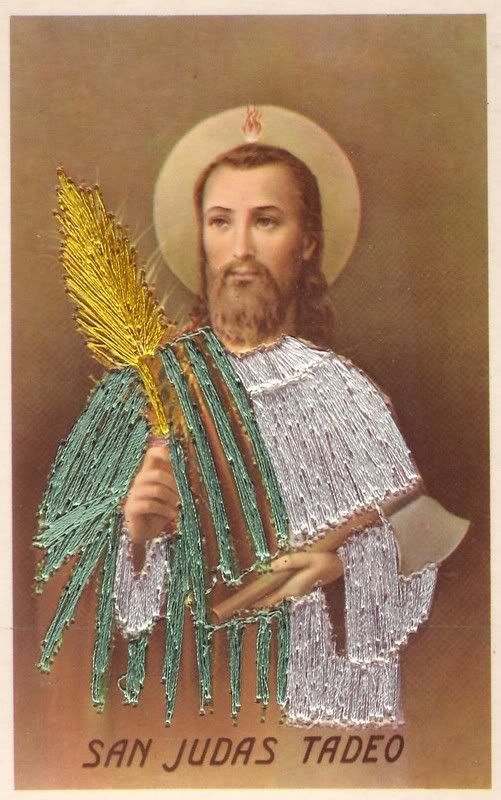
See Catholic Tradition's page on devotions to gain the intercession of Saint Jude.
With a week to go before the election, maybe we had better beseige St. Jude with requests for intercession for victory to the McCain campaign. The best polls show the gap narrowing, but it may be too little too late, without a lot of prayer from St. Jude.

See Catholic Tradition's page on devotions to gain the intercession of Saint Jude.
With a week to go before the election, maybe we had better beseige St. Jude with requests for intercession for victory to the McCain campaign. The best polls show the gap narrowing, but it may be too little too late, without a lot of prayer from St. Jude.
Labels: Our Saintly Brethern
Sunday, October 26, 2008
Christus Rex
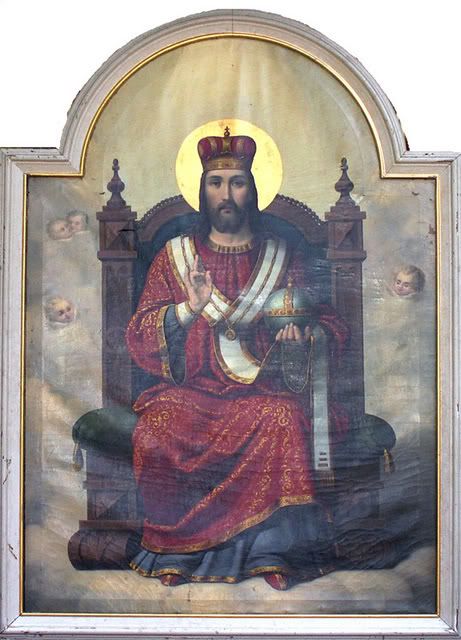
Prayer to Christ the King
O CHRIST, JESUS, I acknowledge Thee as Universal King.
For Thee all creatures have been made. Do Thou exercise
over me all the rights that Thou hast.
Renew my Baptismal Vows, I renounce Satan,
with all his works and pomps, and I promise to live as a
good Catholic: Especially, do I pledge myself, by all
the means in my power, to bring about the triumph of the
rights of God and of Thy Church.
Divine Heart of Jesus, I offer Thee all my poor actions to obtain
that all hearts may recognize Thy Sacred Royalty, and that thus the
reign of Thy Peace may be established throughout the entire world.
Amen.

O Jesus King Most Wonderful: From The Raccolta
O Jesus, King most wonderful,
Thou Conqueror renowned!
Thou Sweetness most ineffable,
In Whom all joys are found!
When once Thou visitest the heart,
Then truth begins to shine;
The earthly vanities depart;
Then kindles love Divine.
O Jesus, Light of all below!
Thou Fount of life and fire,
Surpassing all the joys we know,
And all we can desire!
May every heart confess Thy Name,
And ever Thee adore;
And seeking Thee, itself inflame
To seek Thee more and more.
Thee may our tongues forever bless;
Thee may we love alone;
And ever in our lives express
The image of Thine Own. Amen.
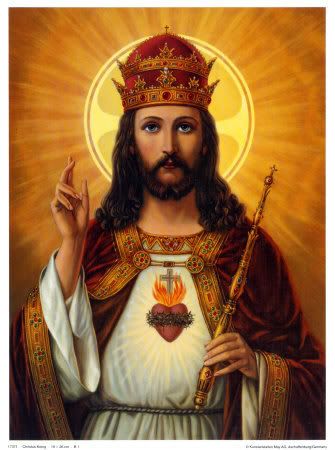
Labels: Christus Rex











